While the theatrical calendar is still very much up in the air, distributors are dating films as long as cinemas remain in business—thus we have a fairly comprehensive fall preview. As we do each year, after highlighting the best films offered thus far, we’ve set out to provide of an overview of the titles that should be on your radar this upcoming season––and while some dates will certainly shift, it’s quite a promising lineup of films.
Featuring 50 films, the below preview includes both the best we’ve already seen (with full reviews where available) and the anticipated with (mostly) confirmed release dates over the next four months. A good amount will premiere over the next few weeks at Telluride, Venice, TIFF, and NYFF, so check back for our reviews.
Faya Dayi (Jessica Beshir; Sept. 3 in theaters)
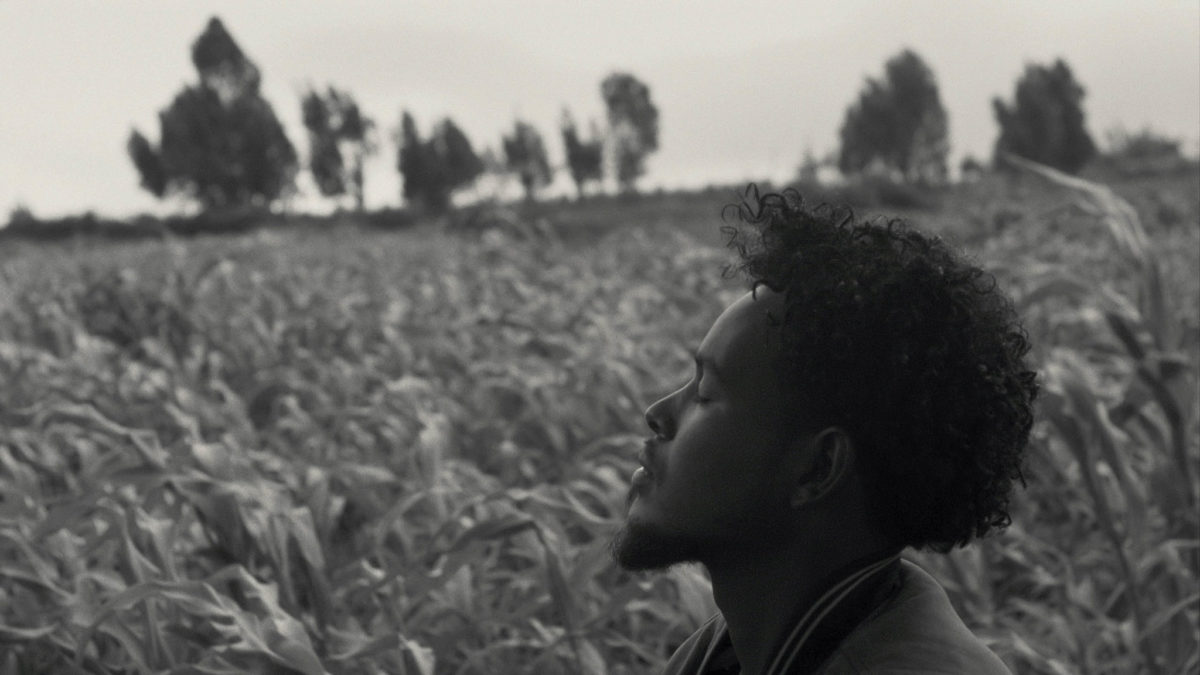
“Look how far God has brought us. We can only go where God guides us to. We are exactly where God wants us to be.” These are the first words spoken in Jessica Beshir’s ruminative and ravishing feature debut Faya Dayi, and it establishes a conversational dialogue with a higher realm that carries through the rest of this graceful, ethereal journey through Ethiopia. Specifically exploring the trade of the khat leaf––a hallucinatory plant used by Sufi Muslims for religious meditation but has now become Ethiopia’s most lucrative cash crop––Beshir deeply immerses the viewer into daily work, spiritual ponderings, and questions of life’s purpose. At times recalling Apichatpong Weerasethakul’s striking black-and-white debut Mysterious Object at Noon and the vivid chiaroscuro work of Pedro Costa, Faya Dayi shares a similar approach to mixing documentary and narrative elements to form a transportive ethnographic survey. – Jordan R. (full review)
Anne at 13,000 Ft (Kazik Radwanski; Sept. 3 in theaters)
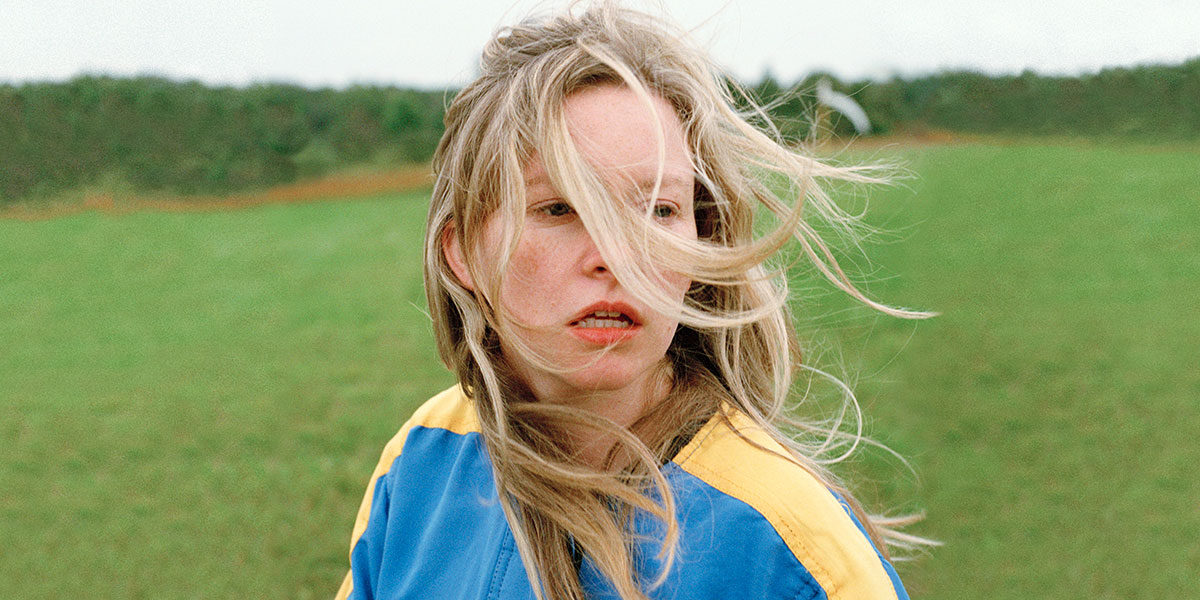
Anne (Deragh Campbell) is in stasis. Doing four shifts a week at a Toronto daycare, she’s repeatedly given a hard time by co-workers (or the managerial state in general) for being “unprofessional,” i.e. daydreaming or playing too much with the kids. Perhaps a reflection of how many of us reach a certain point, say in our late 20s, where we realize that we’re not going to actually be made happy by our career. Beyond struggling at work, Anne’s interactions with friends, family, and Tinder dates alike all take on different plains of awkwardness; she struggles to maintain conversation, a straight face, or even a line of thought. – Ethan V. (full review)
The Year of the Everlasting Storm (Various; Sept. 3 in theaters)
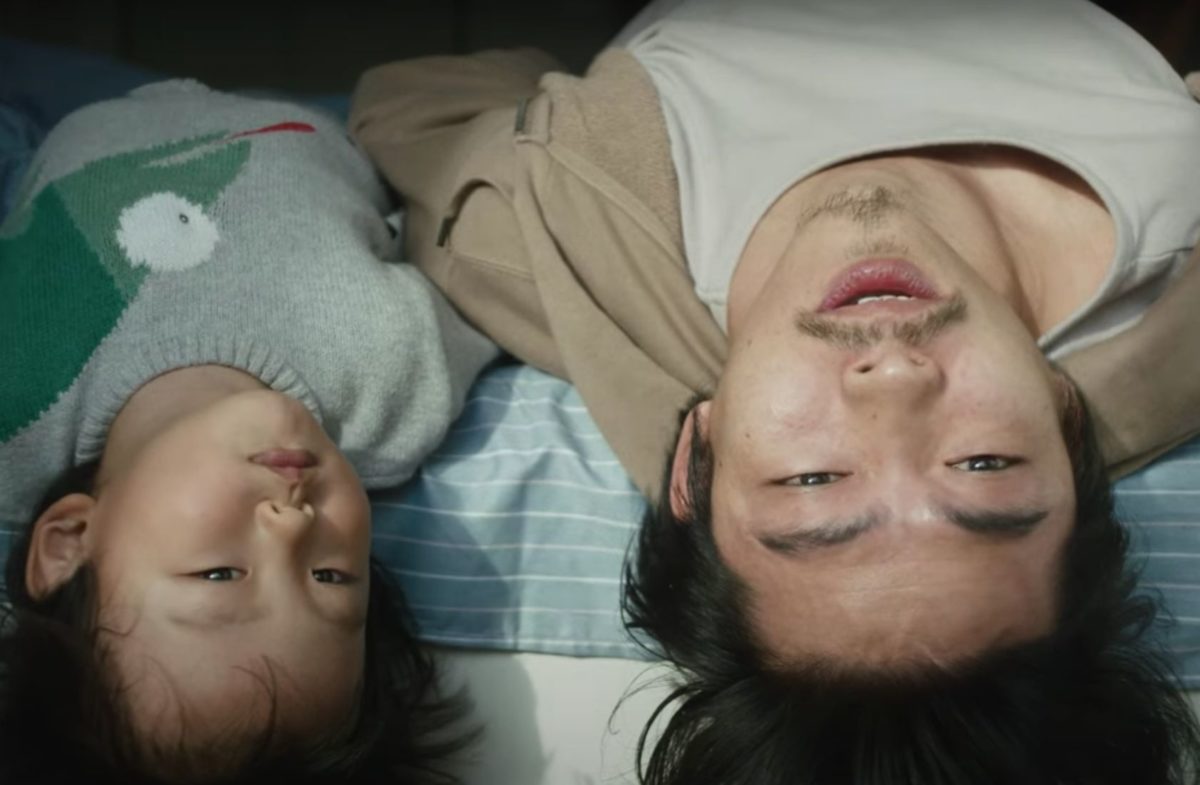
Anthology films like The Year of the Everlasting Storm, wherein a flurry of esteemed directors create short segments tethered to a common theme, lack a strong track record. Take the Cities of Love series (Paris, New York, Rio, and Berlin), September 11, or To Each His Own Cinema. All have memorable, if not masterful, pieces. But it doesn’t matter how many noteworthy names are involved or how great some shorts might be—the collective feature experience often falls prey to a certain disjointedness endemic to the territory. – Luke H. (full review)
Wild Indian (Lyle Mitchell Corbine, Jr.; Sept. 3 in theaters and on VOD)

Wild Indian is a bold, anger-wreaked character study, creating a deeply unsympathetic antihero who nevertheless inspires some pity and understanding. Although representation for indigenous American people in the arts is increasing, it’s still hard to recall a film quite like Lyle Mitchell Corbine Jr.’s debut, which moves its Native American characters from a cinematic periphery they’re most often found towards the center. Its story of an upwardly mobile Ojibwe man (Michael Greyeyes), haunted by a past crime, surprises us, its progression almost like an old-fashioned morality tale, and Corbine feels no pressure to skew to politically correct positive representations. – David K. (full review)
The Card Counter (Paul Schrader; Sept. 10 in theaters)
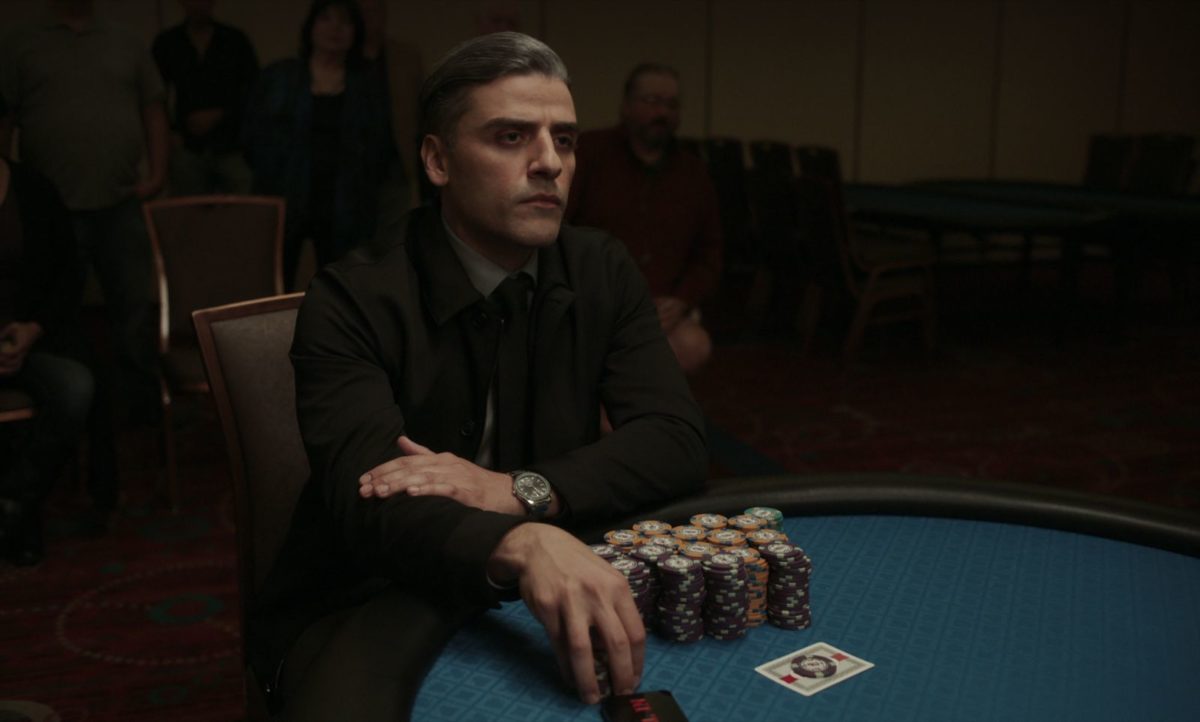
I’ll try not to say too much lest I find a laser sight planted directly on my forehead, but what if—hypothetically—The Card Counter being sold as a cool revenge tale was a marketing ploy to cover for something distinctly in the First Reformed style? Just what if. Maybe we’re placing it here for good reason—hypothetically. – Nick N.
Azor (Andreas Fontana; Sept. 10 in theaters)
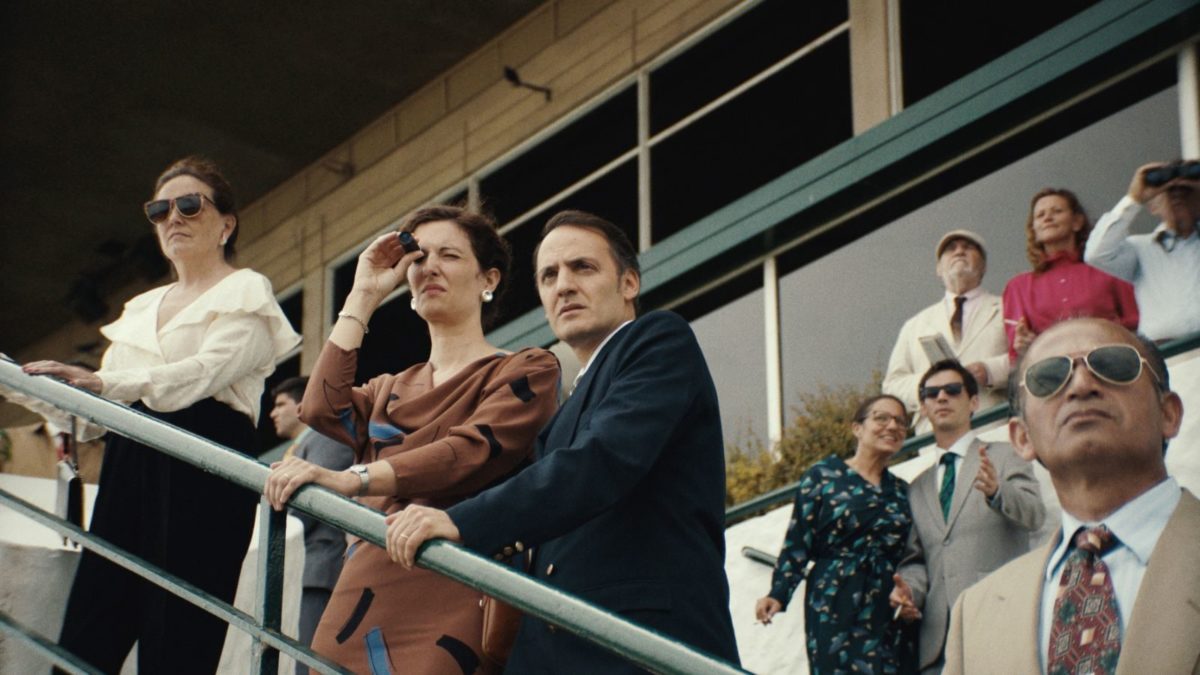
An almost suffocating air of secrecy permeates Azor, a Swiss-Argentinean coproduction concerning the mutual suspicion and damnable complicity of patrician North Atlantic capitalism and repressive regimes in the postcolonial Global South. The year is 1980, and a private banker from Geneva circulates among the Buenos Aires elite. This is at the height of the Dirty War, though so absolute is the Swiss banker’s discretion—so clean his hands—that the military junta’s crimes against its people feel as suggestively peripheral to the film’s narrative as the word “disappeared” implies. Filmmaker Andreas Fontana’s debut feature is a film of almost Le Carréan subtlety, of oblique plotting, crouching dialogue, and guarded performances masking sinister realpolitik. – Mark A. (full review)
Cry Macho (Clint Eastwood; Sept. 17 in theaters and on HBO Max)
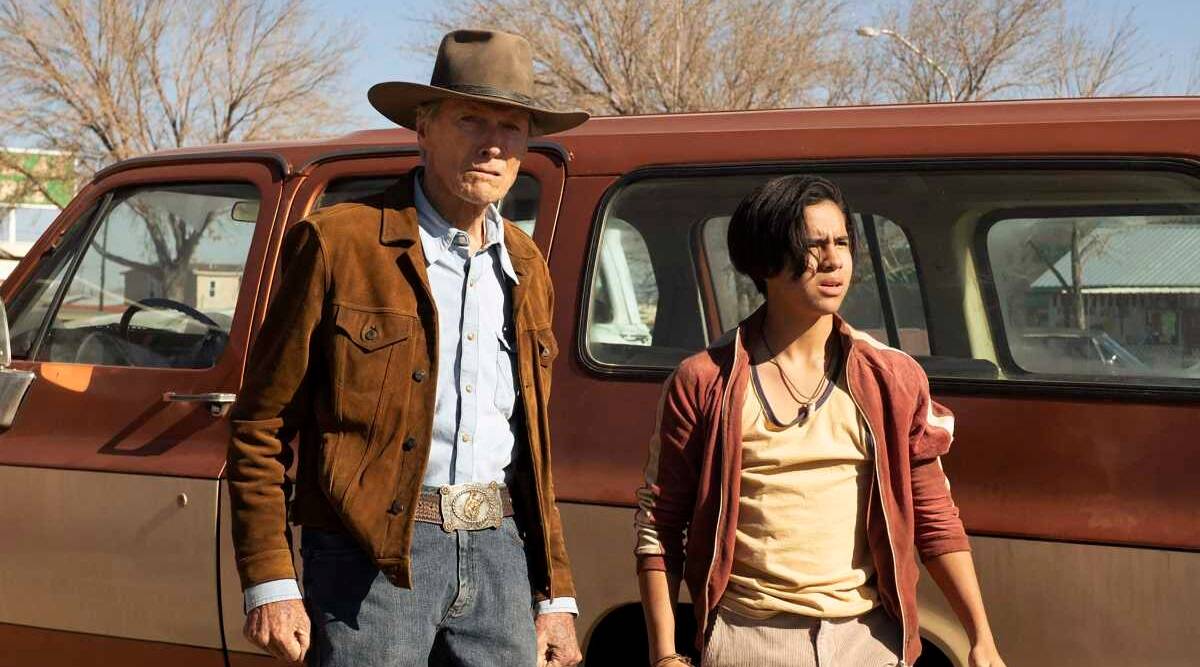
However your mileage on late (late) Clint varies, there’s little need to argue his star vehicles—of which, granted, there have been but two in the last fifteen years—are this great director’s prime material. Lest we get too deep into the auteurist-deconstructivist angle, let it just be said his road movie / western-of-sorts bears the trademarks of many classics before it: shades of Bronco Billy, Honkytonk Man, A Perfect World, and 2018’s The Mule all in one trailer. And if you aren’t immediately, unceasingly moved by one of American cinema’s greatest icon—certainly its most valuable living commodity—looking and sounding his 90 years, we just walk different paths in this life. Appreciate these works while they’re still here. – Nick N.
The Nowhere Inn (Bill Benz; Sept. 17 in theaters and on VOD)
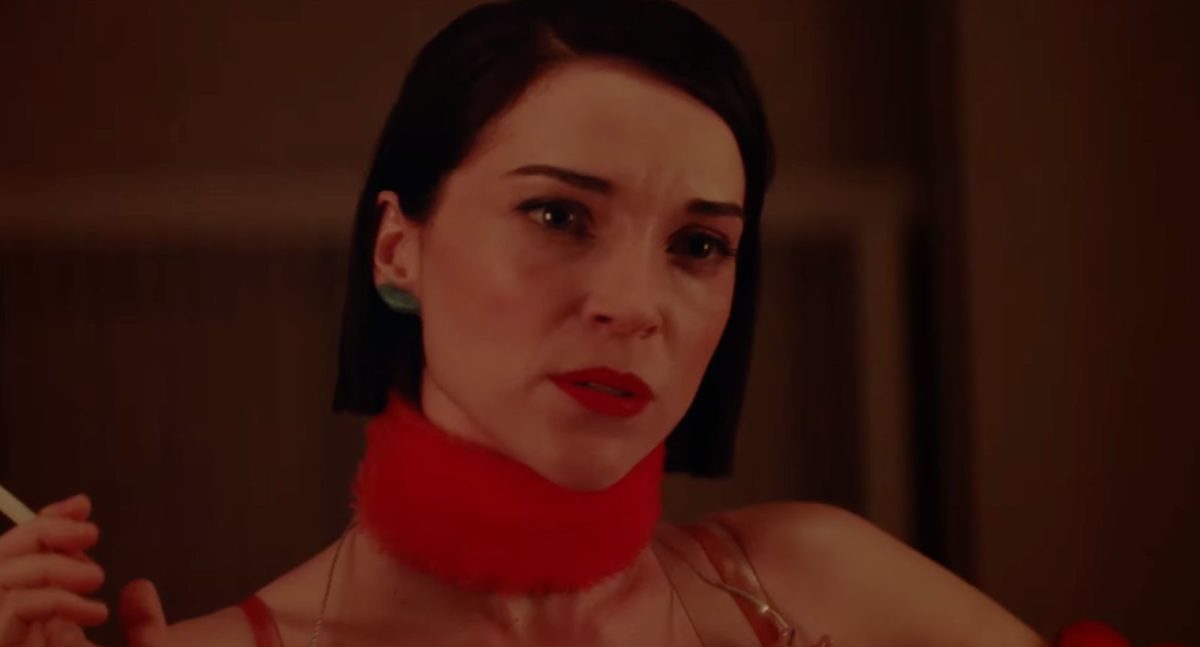
The criticism of any film––narrative or documentary––featuring a musical artist playing him or herself is that it begins to feel more like branded IP than a natural extension of the artist’s work. For some, like Bruce Springsteen, a level of self-awareness about their process and inspiration is a feature, not a bug. For so many others, including the Beatles and Spice Girls, big-screen outings were largely fan service. Now this brings us to the beautiful and enigmatic Annie Clark, who is painfully aware of her persona as woman of mystery. Directed by Bill Benz from a script by Clark and Carrie Brownstein, The Nowhere Inn is a self-reflective comedy wherein Clark plays herself, taking the role of her onscreen persona St. Vincent, who goes in search of truth and authenticity for the creature she has created. – John F.
The Mad Women’s Ball (Mélanie Laurent; Sept. 17 on Amazon Prime)
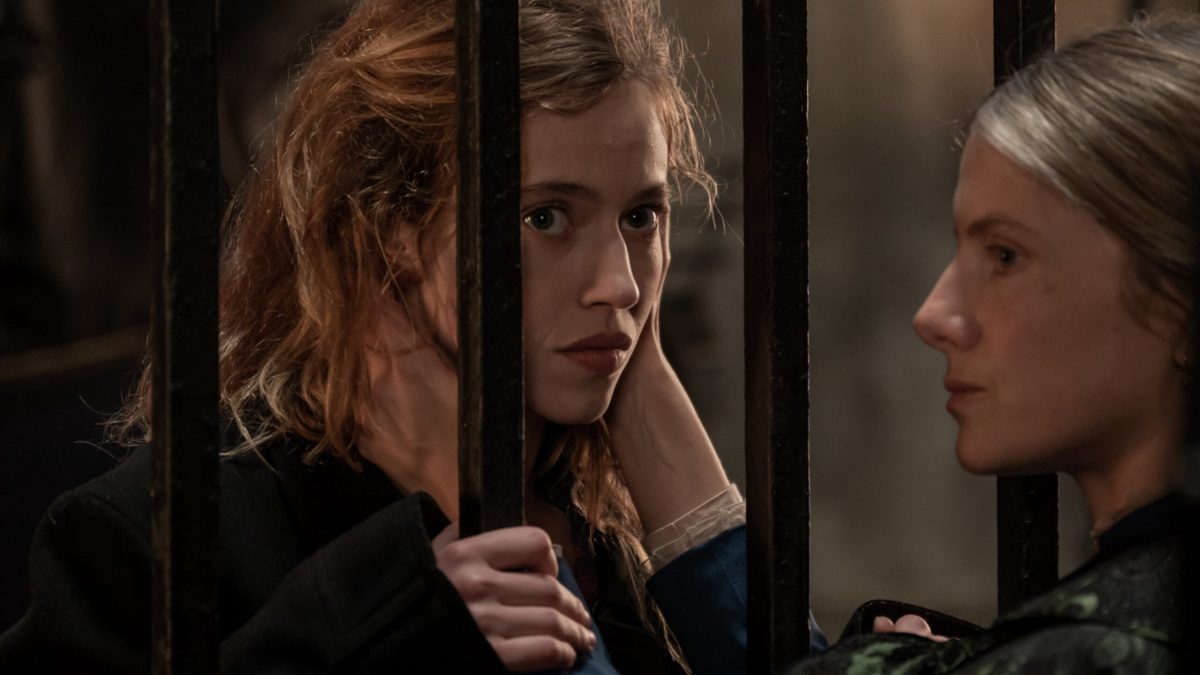
Mélanie Laurent writes, directs, and stars in this period thriller based on the novel of the same name by Victoria Mas. Set in Paris at the end of the 1800s, the film concerns an independent woman who is deemed mentally unwell and institutionalized. Once inside, she desperately attempts to escape. The title refers to a year-end ball in which patients are dressed up and shown off for high society in a prestigious bit of patronizing. It’s certainly a provocative-sounding piece that should promise discussion as credits roll. – Dan M.
Wife of a Spy (Kiyoshi Kurosawa; Sept. 17 in theaters)
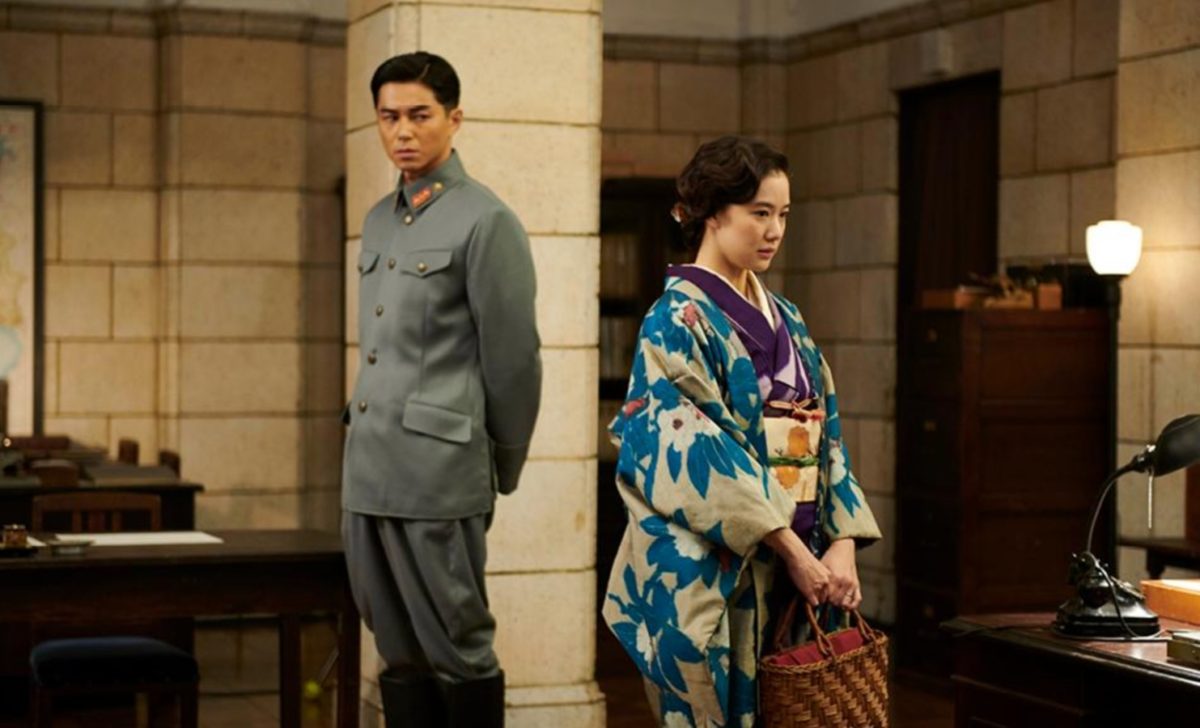
We’re in Kobe in 1940 on the eve of war. An English businessman is being forcefully ejected from his factory by a group of soldiers. “What has become of Japan?” he asks despairingly. So plays the opening sequence of Wife of a Spy, a world-weary wartime romance from Japanese filmmaker Kiyoshi Kurosawa about an affluent married couple who each must ask themselves a thorny question. Their country is at a crossroads, how best to respond? – Rory O. (full review)
Prisoners of the Ghostland (Sion Sono; Sept. 17 in theaters and on VOD)
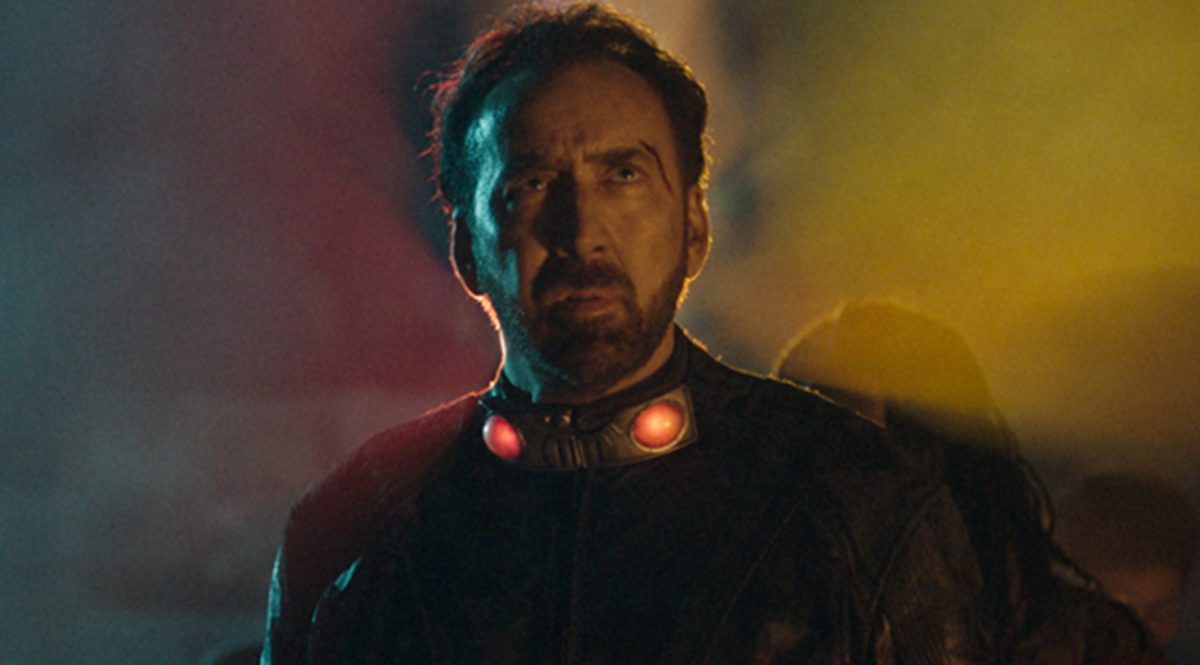
Arguably the hardest working man in show business, Nicolas Cage appeared in over 40 films the last decade alone. Yes, he may no longer work with the likes of David Lynch, Brian De Palma, Francis Ford Coppola, Charlie Kaufman or the Coens, but the eternally entertaining actor usually finds a gem every now and again that truly utilizes his eccentric talents. That’s why the prospect of him teaming with a director as unhinged and prolific as he is an actor made for the most-anticipated collaboration in some time. With Cage as his lead, Sion Sono––one of Japan’s most creative, kinetic filmmakers––embarked on his English-language debut Prisoners of the Ghostland following his life-altering, death-defying heart attack. The results are a madcap Mad Max-esque, Gilliam-style fever dream that throws everything at the screen that its limited, but resourceful budget can muster up. The actual experience of watching this gonzo dystopian samurai western is far from the shock-a-minute journey that one would expect, but even in its more banal sequences, Sono’s imaginative eye peeks through. – Jordan R. (full review)
The Village Detective: a song cycle (Bill Morrison; Sept. 22 in theaters)
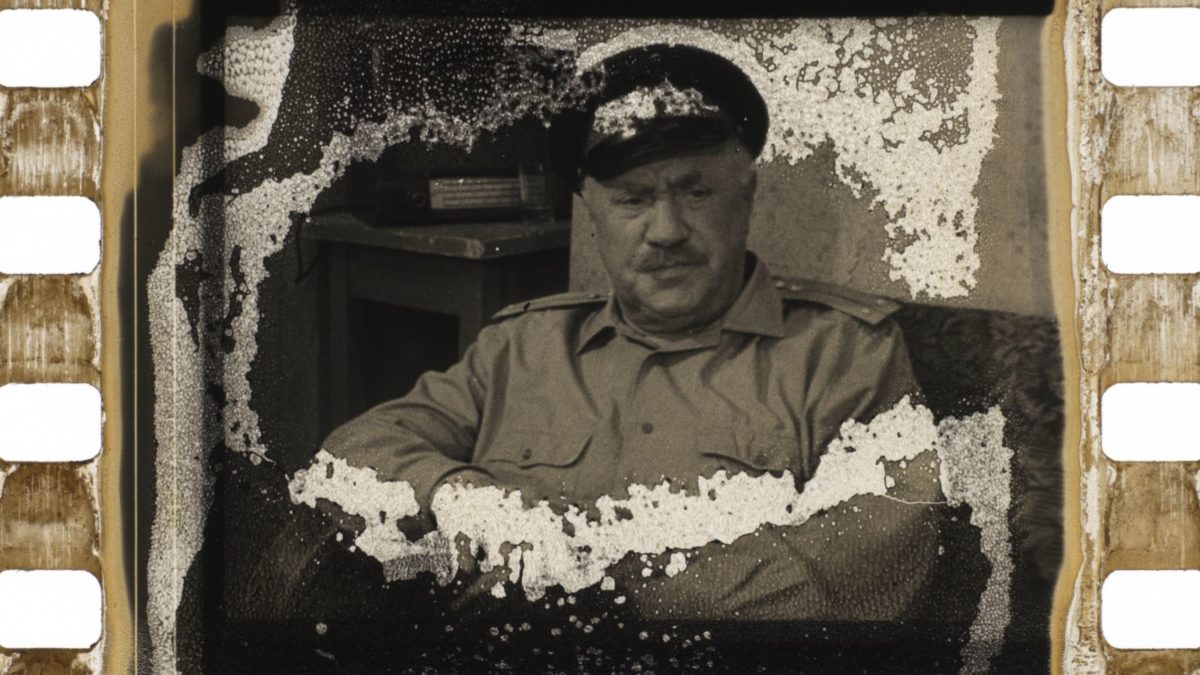
Many filmmakers are preservers of the cinematic tradition, but Bill Morrison is of a rare breed who actually preserves cinema. Morrison’s dedication to archiving and curating lost silent films has made his oeuvre arguably the most underrated of true cinephile directors. The Village Detective, Morrison’s newest and follow-up to Dawson City: Frozen Time, zeroes in on Soviet actor Mikhail Zharov and his deep contribution to cinema, live theater, and other facets of culture. If one thing is certain of Morrison’s work it is his sincere tenderness, the care for each and every one of his subjects. I should expect nothing less of his newest as well. – Benjamin G.
The Most Beautiful Boy in the World (Kristina Lindström & Kristian Petri; Sept. 24 in theaters)
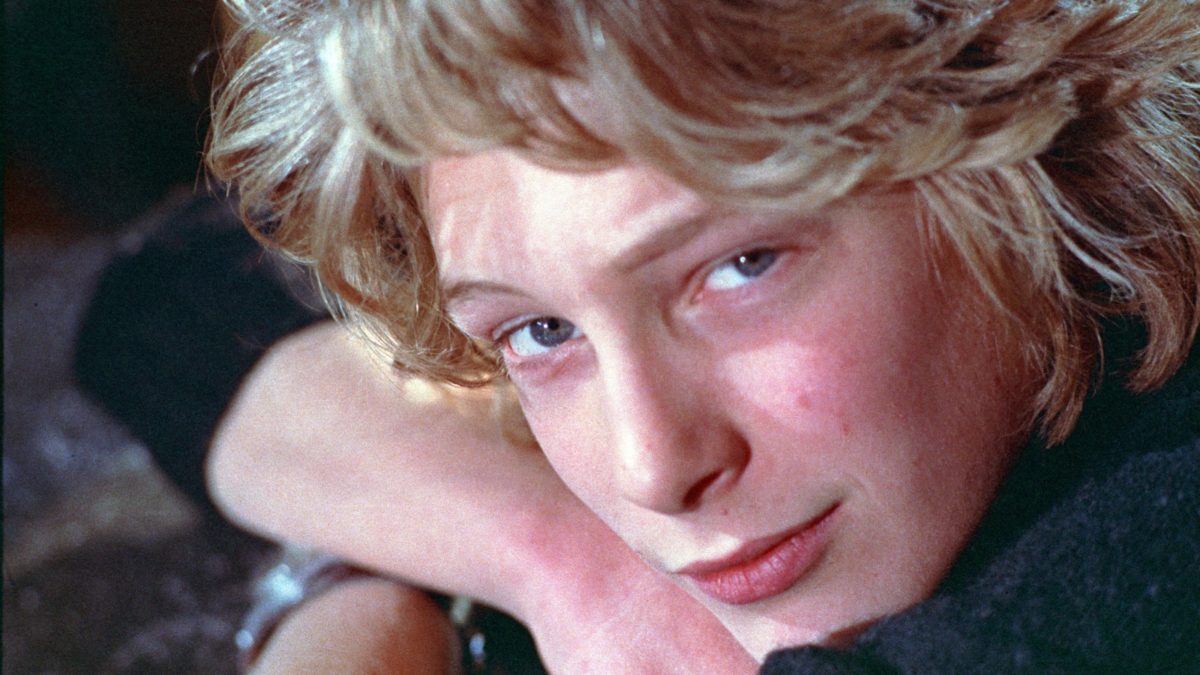
In 1971, Björn Andrésen was the most beautiful boy in the world. In 2019, he’s the elder of a neopagan commune in rural Sweden, whose inability to commit suicide in the fictional ritual of ättestupa forces the other cult onlookers to brutally bash his head in with a rock. In the time between Luchino Visconti’s Death in Venice and Ari Aster’s Midsommar, Andrésen lived a life that might have seemed enviable on the surface, but which he baldly describes in this documentary as a “living nightmare.” It was the fateful casting audition in 1970 Stockholm where Visconti met Andrésen and found his beautiful boy that set the wheels in motion for the rest of his life, marred by personal tragedy, substance abuse, and exploitation. At the film’s conclusion, the woman who oversaw Andrésen’s casting alongside Visconti regretfully reflects on the day that shifted the course of his life forever, unable to separate the years that followed from the first moment this minor was forced out of his innocence. – Brianna Z. (full review)
El Planeta (Amalia Ulman; Sept. 24 in theaters and VOD on Oct. 8)

In a café in Gijón, Spain, Leonor (Amalia Ulman) sits with a cup of coffee. An older man (Nacho Vigalondo) approaches her and joins her, and the two start discussing some sort of transaction. She’s considering sleeping with him for money, but then she reconsiders. “I’m wondering if it’s worth sucking a dick for a book.” Like Leonor’s own little gig economy she’s come to, this is one of the many vignettes El Planeta finds itself in. She was a fashion student in London before, but now that her father (and cat) has died, she’s home living with her mother (Ale Ulman), who’s facing eviction. The unemployment office has failed them and their time is scarce. Naturally, they start grifting to get meals and lower their bills. If someone else can pay for dinner, that’s great. If Leonor can sit in the hallway to read so she doesn’t have to turn on the lights, that adds up too. I’d be sad if it didn’t have such a droll approach. In some ways, it is. El Planeta isn’t the most thematically consistent, but it’s clever and brisk enough to be a good time. – Matt C. (full review)
Titane (Julia Ducournau; Oct. 1 in theaters)
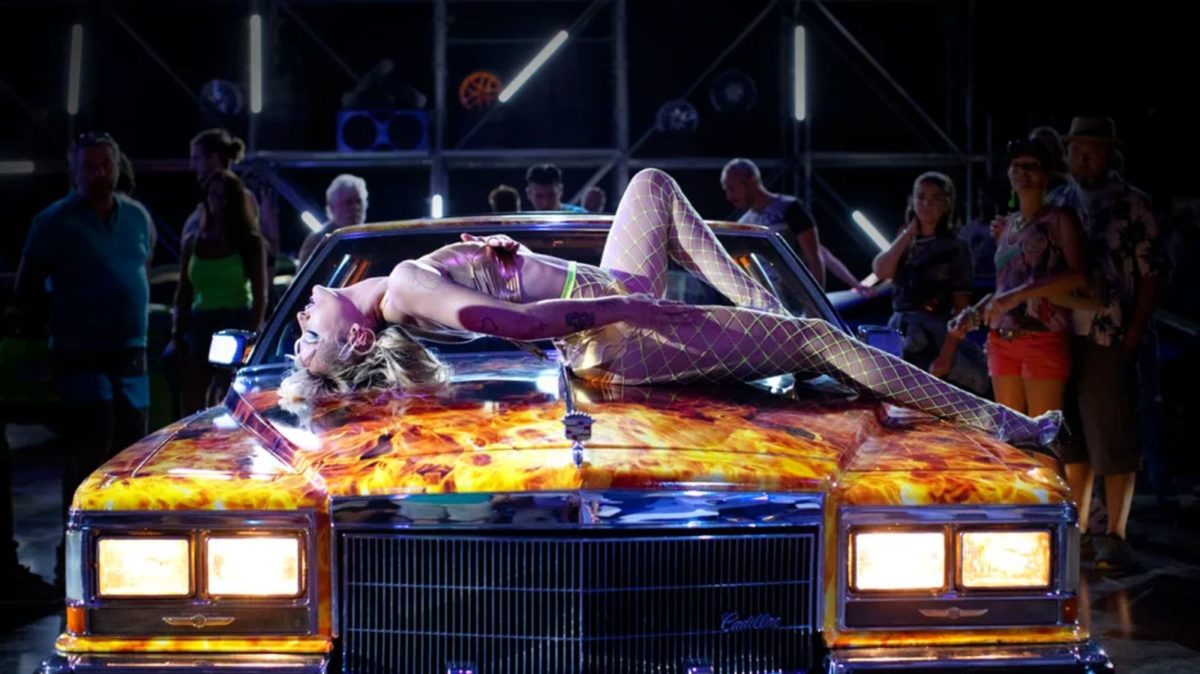
Titane begins not with a whimper but a cacophony: a deafening engine rev; the crash as car meets concrete; then the image of a girl in a horrific head-brace, like something from a Saw film, as she gets fitted with a titanium plate. Next a temporal leap to a car show, erotic dancers, pulsating synth music, chrome, and neon. The girl from the crash appears from the milieu, now a serial killer and car show dancer. After the show, a stalker follows her to her car and gets a needle the size of a chopstick lodged in his eardrum. His mouth sputters like a piece of faulty machinery. Scarcely 10 minutes have passed. – Rory O. (full review)
The Many Saints of Newark (Alan Taylor; Oct. 1 in theaters and on HBO Max)
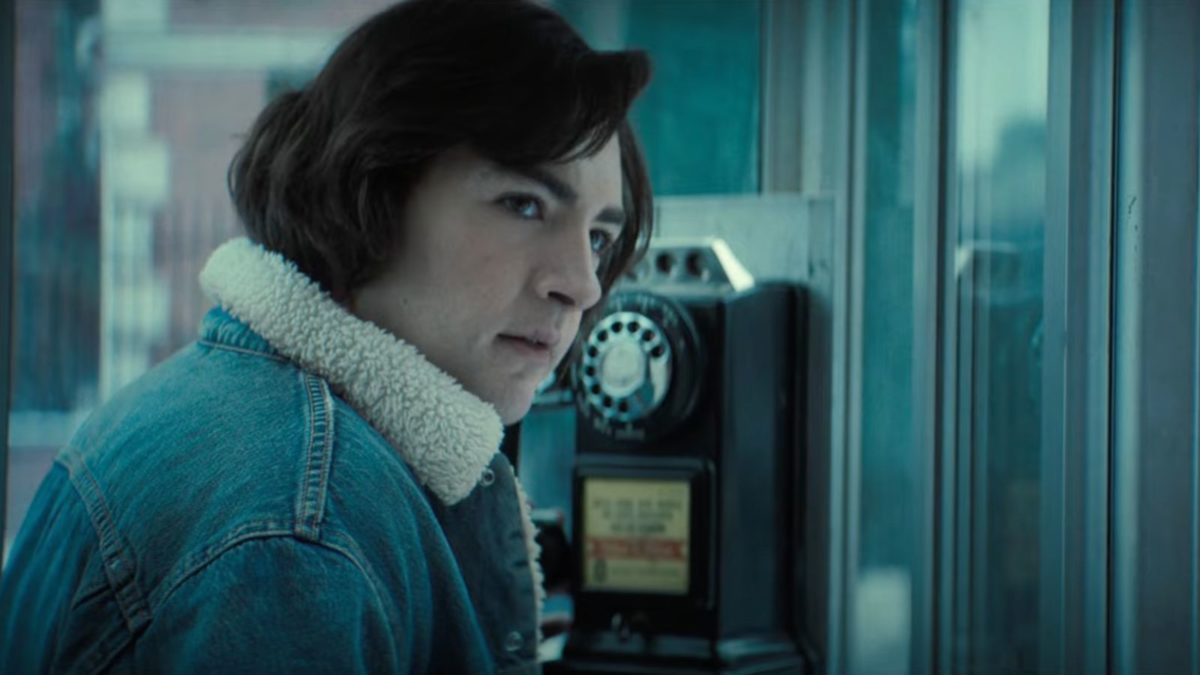
“Lately, I get the feeling that I came in at the end. The best is over.” So laments mafioso baby boomer Tony Soprano in the very first episode of David Chase’s epochal TV series bearing his name. But while The Sopranos was the definitive postmodern mob saga, this fall’s The Many Saints of Newark—written and produced by Chase alongside Sopranos veteran Lawrence Konner, and directed by fellow series alum Alan Taylor—will turn back the clock on Chase’s intricate parallel universe of feuding East Coast crime families to the waning years of the Cosa Nostra’s heyday, the political and social turmoil of the 1960s and ’70s. Following the travails of legendary mobster Dickie Moltisanti (Alessandro Nivola), father of Michael Imperioli’s wayward Christopher, The Many Saints is likely to be more of a stand-alone drama occupying the same fictional universe than a “prequel” in the George Lucas sense. But that doesn’t mean there won’t be any familiar characters from the show; among them is a young Tony Soprano, played by none other than the late, great James Gandolfini’s son Michael. – Eli F.
No Time to Die (Cary Joji Fukunaga; Oct. 8 in theaters)
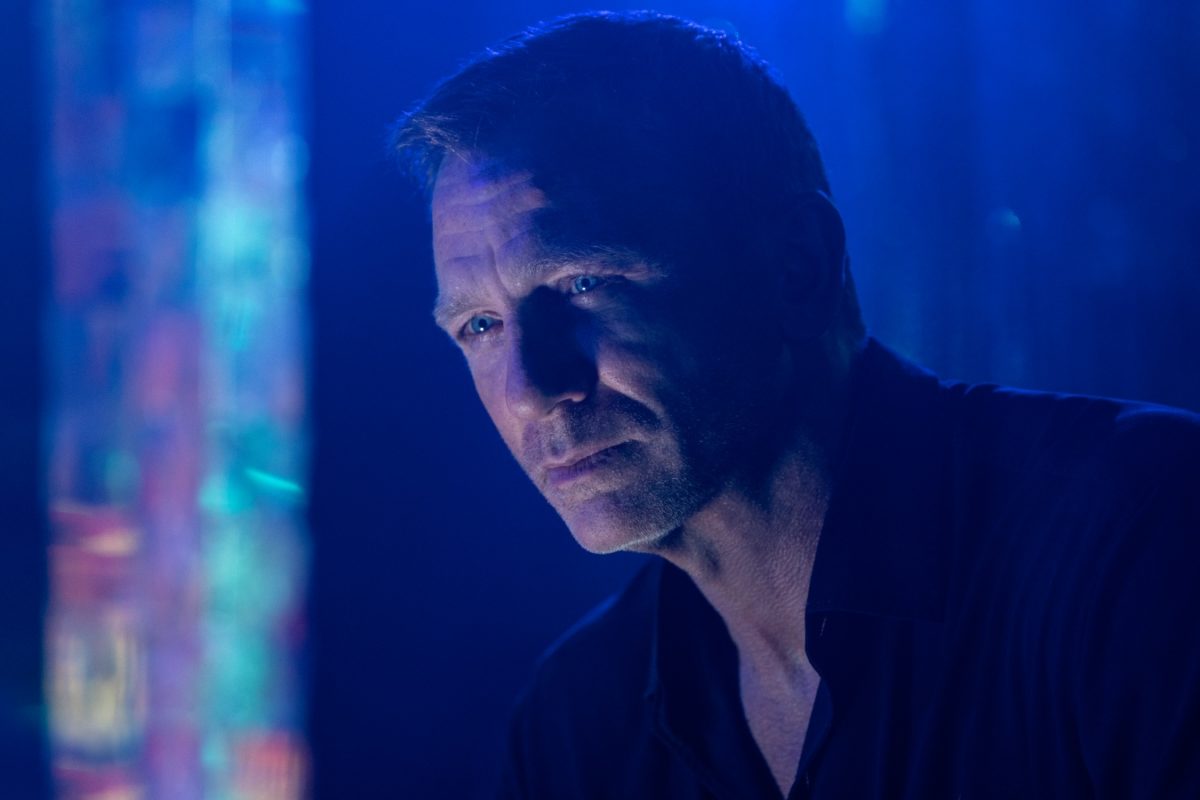
The 25th official Bond film promises, at the very least, to be a lot. We’ve got a presumably ham-fisted Rami Malek as the Big Bad, a returning Christoph Waltz as Blofeld, with a touch of Ana de Armas and a Phoebe Waller-Bridge screenplay credit. This film finds Bond five years into retirement, forced back into a new world of heroes and villains. One provocative addition is Lashana Lynch joining as the new “007” agent. Cary Joji Fukunaga directs (he has a writing credit alongside Waller-Bridge and Bond stalwarts Neal Purvis & Robert Wade) what is confirmed to be Daniel Craig’s last hurrah as the debonair spy. – Dan M.
Mass (Fran Kranz; Oct. 8 in theaters)
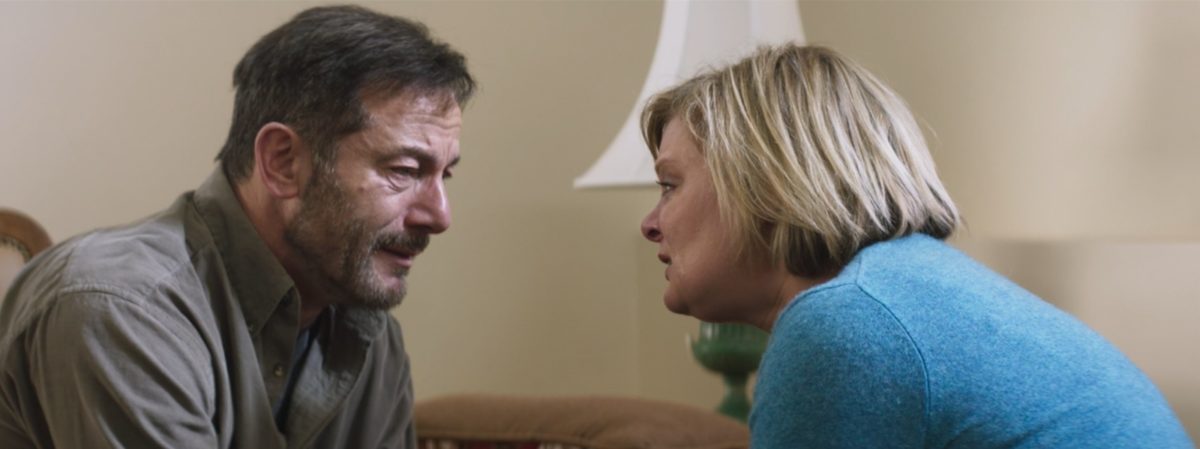
Set in the meeting room of a modest Episcopalian church, two couples meet under tragic circumstances. For his directorial debut Mass, accomplished actor Fran Kranz is determined to wring out four incredible performances from four incredible character actors through the discussion of an extremely tough subject. It is mission accomplished as Kranz succeeds in finding understanding in the unthinkable. – Dan M. (full review)
Wheel of Fortune and Fantasy (Ryūsuke Hamaguchi; Oct. 15 in theaters and Virtual Cinemas)
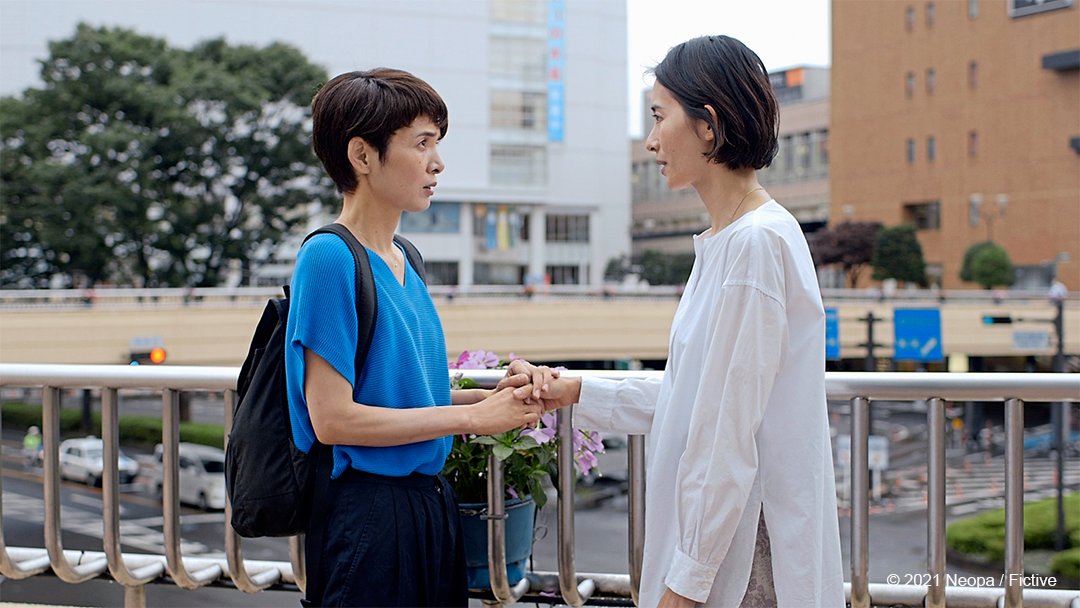
Wheel of Fortune and Fantasy is cinema portmanteau: three short stories focused on three different characters, each a little lovesick and just a little lost. The director is Ryūsuke Hamaguchi, an emerging filmmaker from Japan who seems to have already mastered his craft, and whose work is perfectly at home to such dilemmas. His 2015 film Happy Hour, a five-hour saga, followed the lives of four women in Kobe, one of whom had filed for divorce. Next came Asako I & II in 2018, an adaptation of Tomoka Shibasaki’s novel about a woman who starts seeing a man who looks exactly like the boy she loved when she was younger––a story of doppelgängers, it also showcased his touch for surrealist flourishes. – Rory O. (full review)
The Velvet Underground (Todd Haynes; Oct. 15 in theaters and on Apple TV+)
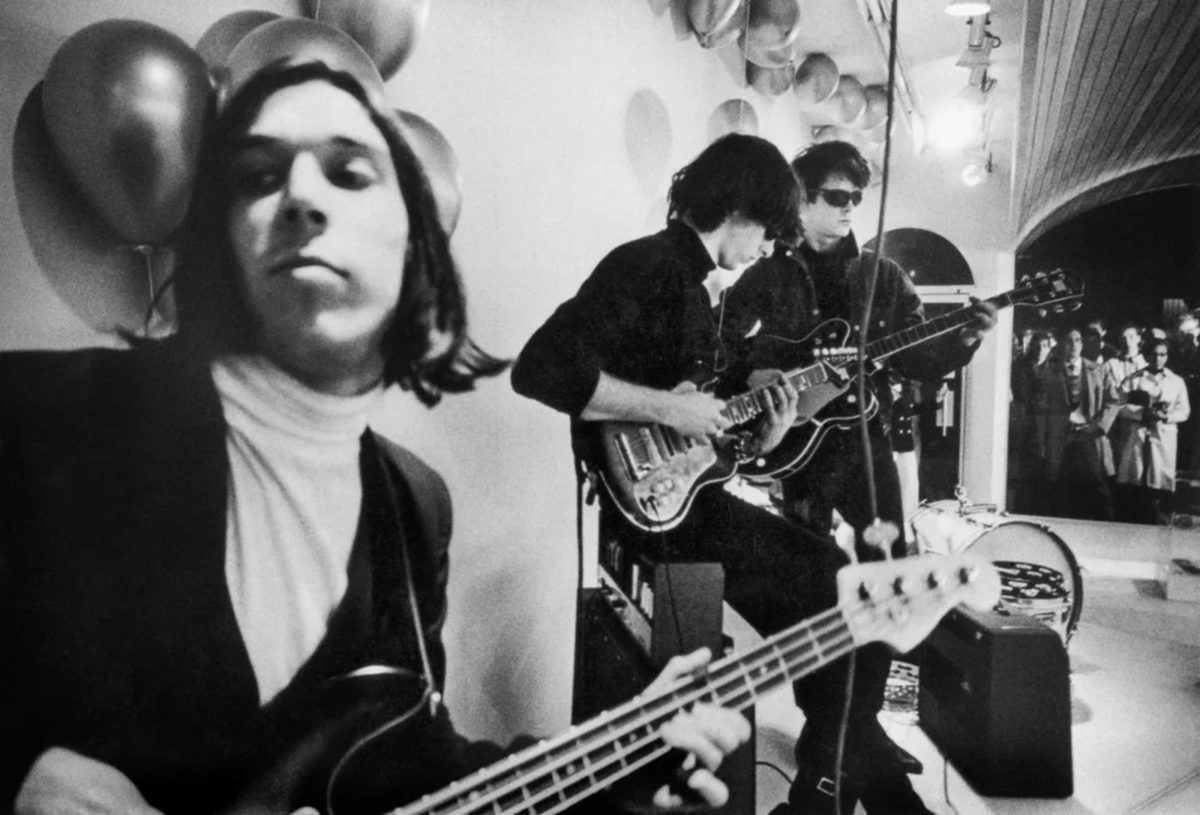
If you told people in 1967 that Andy Warhol’s house band just released one of the most revered rock albums of all-time, they would ask what they’re called, and when you told them they would laugh. As far as the public was concerned, there were a hundred acts capable of that historical success in the ‘60s, and none were called the Velvet Underground (or Nico). To a certain extent they would be right. It would be another decade before the banana-adorned The Velvet Underground & Nico would have its pop cultural comeuppance and over half a century before the glam avant-garde group would receive definitive documentary treatment by one of the best living filmmakers. But as history and said doc have proven, we would have the last laugh in that exchange. – Luke H. (full review)
Bergman Island (Mia Hansen-Løve; Oct. 15 in theaters)
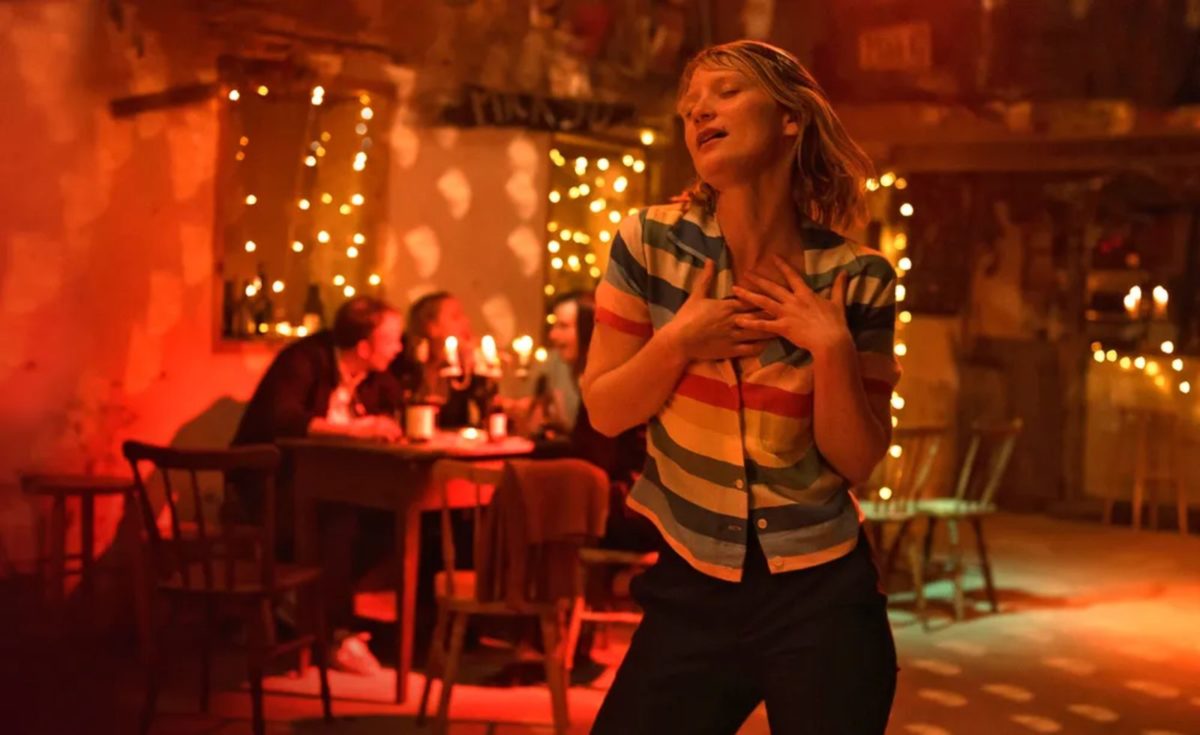
Parenthood, relationships, and the creative process: three key elements of the cinema of Mia Hansen-Løve casually combine in Bergman Island, a playfully self-aware meta-portrait of the filmmaker and, indeed, of filmmaking itself. Introspective, inventive, and effortlessly calm; it follows a couple, both screenwriters, on an idyllic work retreat to Fårö, an island in the Baltic Sea (population: 498) just off the South East of Sweden. It’s the place Ingmar Bergman called home for the majority of his life, where he made many films and eventually died. – Rory O. (full review)
The Last Duel (Ridley Scott; Oct. 15 in theaters)
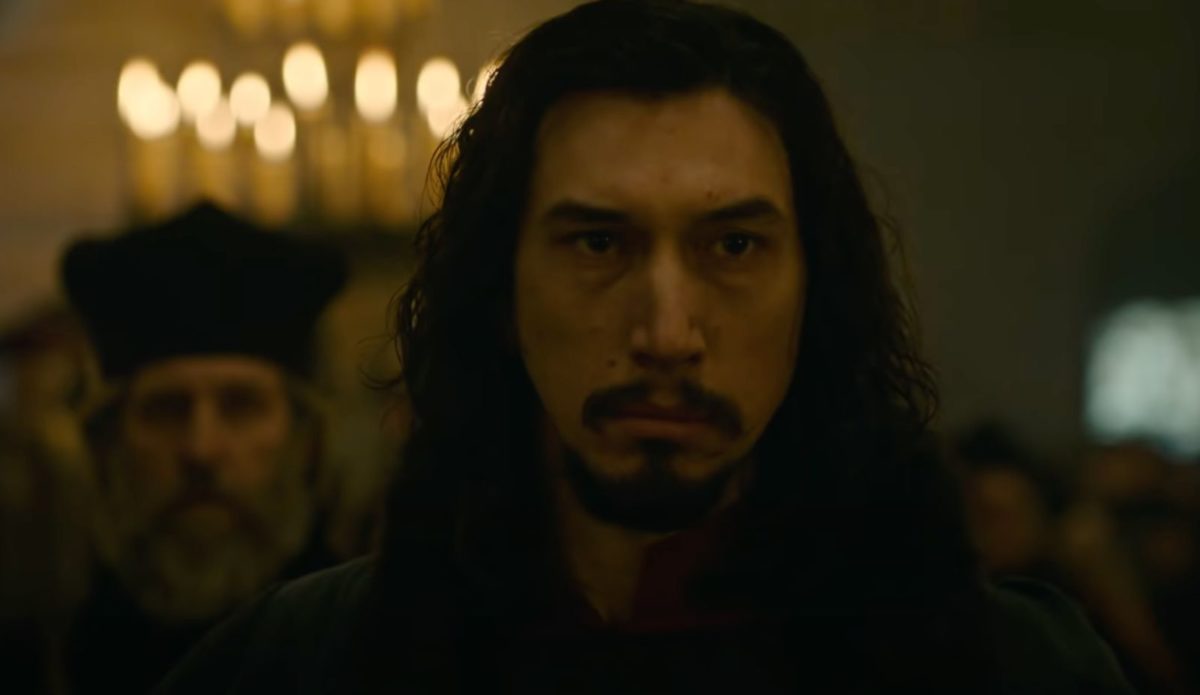
At long last, Ben Affleck and Matt Damon wrote another screenplay together—with an assist from the great Nicole Holofcener. And this time Boston is nowhere to be found. The Last Duel tells the sordid tale of France’s final officially sanctioned duel. When Jean de Carrouges (Damon) accuses his squire (Adam Driver) of raping his wife (Jodie Comer), the king orders a trial by combat. Directed by living legend Ridley Scott, the narrative appears to split into three versions of the truth, as told by each of the three leads à la Rashomon. The film’s cinematographer Dariusz Wolski spoke of his excitement for this picture when he spoke with our B-Side podcast earlier this year. – Dan M.
Luzzu (Alex Camilleri; Oct. 15 in theaters)
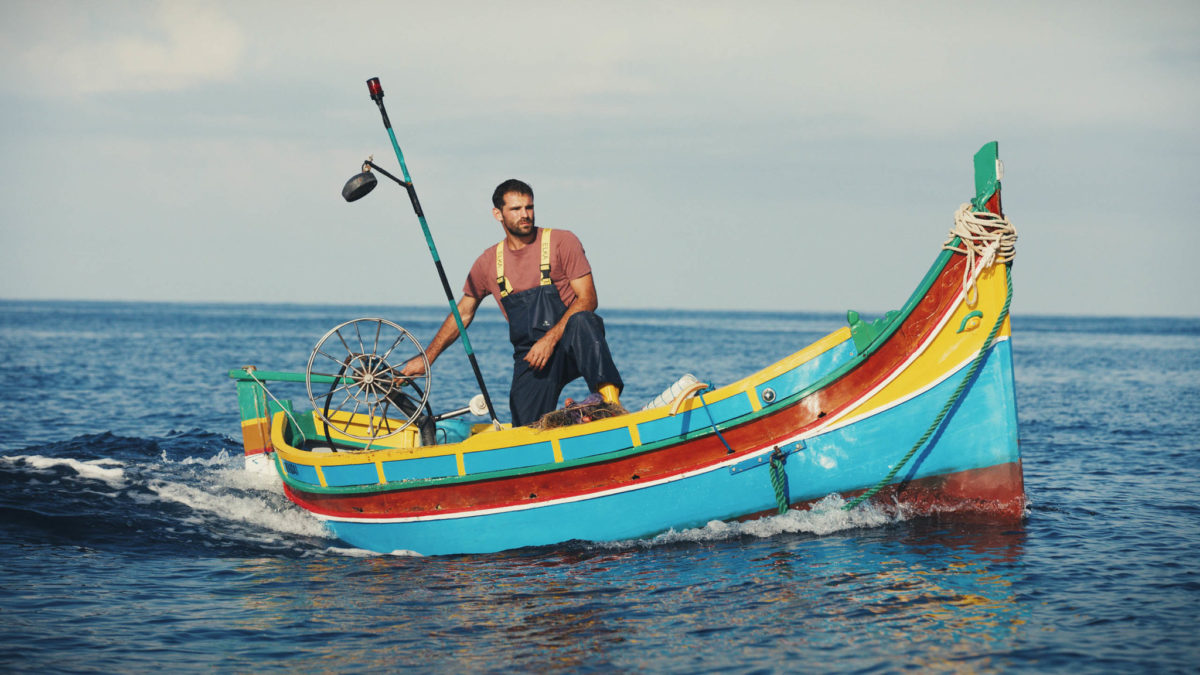
Filmed and set in Malta, director Alex Camilleri’s debut Luzzu follows Jesmark, a fisherman and new father, in his attempt to find the money and resources to give his young family a good life. Set up by a simple premise and hyperrealist approach, the film pits dreams against pragmatism as Jesmark struggles to abandon his generational pull towards hitting the open sea in a tiny, hand-painted boat. As most audiences will find, we’re even less aware of Maltese life and this culture of fishing than we think. Camilleri, a Maltese-American, has spent the last decade working as an editor and assistant editor on a number of films, collaborating often with Iranian-American director Ramin Bahrani. Camilleri takes a naturalist path in his first film, edging on documentary fiction, his leading man (Jesmark Scicluna) with a hardened face and unwillingness to smile. – Michael F. (full review)
Dune (Denis Villeneuve; Oct. 22 in theaters and on HBO Max)
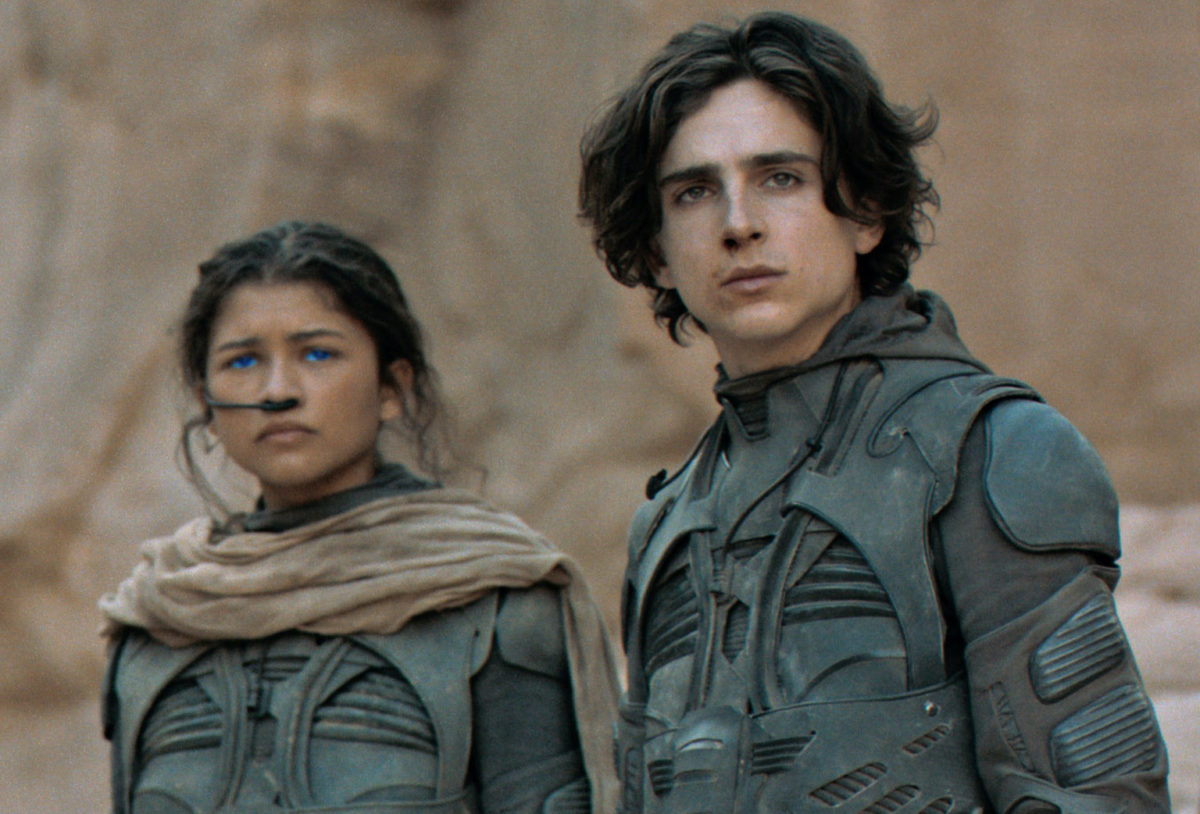
We can already grant this major merit over its franchise-hopeful brethren: there’s real capacity for disaster. If adapting Dune is one thing—prior big-screen renditions of Frank Herbert’s long, terminology-dense tome didn’t quite leave audiences buzzing for more Arrakis––Denis Villeneuve’s choice to base a film on its talky, politics-heavy first half and save worm-riding battles for later is simply insane. And whatever might be said about the overbearing seriousness of his films, a hard sci-fi epic with spot-on casting (Timothée Chalamet as Paul Atreides, Stellan Skarsgård as Baron Harkonnen, Javier Bardem as Stilgar) is ripe with possibility. To which end remains to be seen, but I expect something far less desperate for affection than, say, another Oscar Isaac-starring space adventure. – Nick N.
Jackass Forever (Jeff Tremaine; Oct. 22 in theaters)
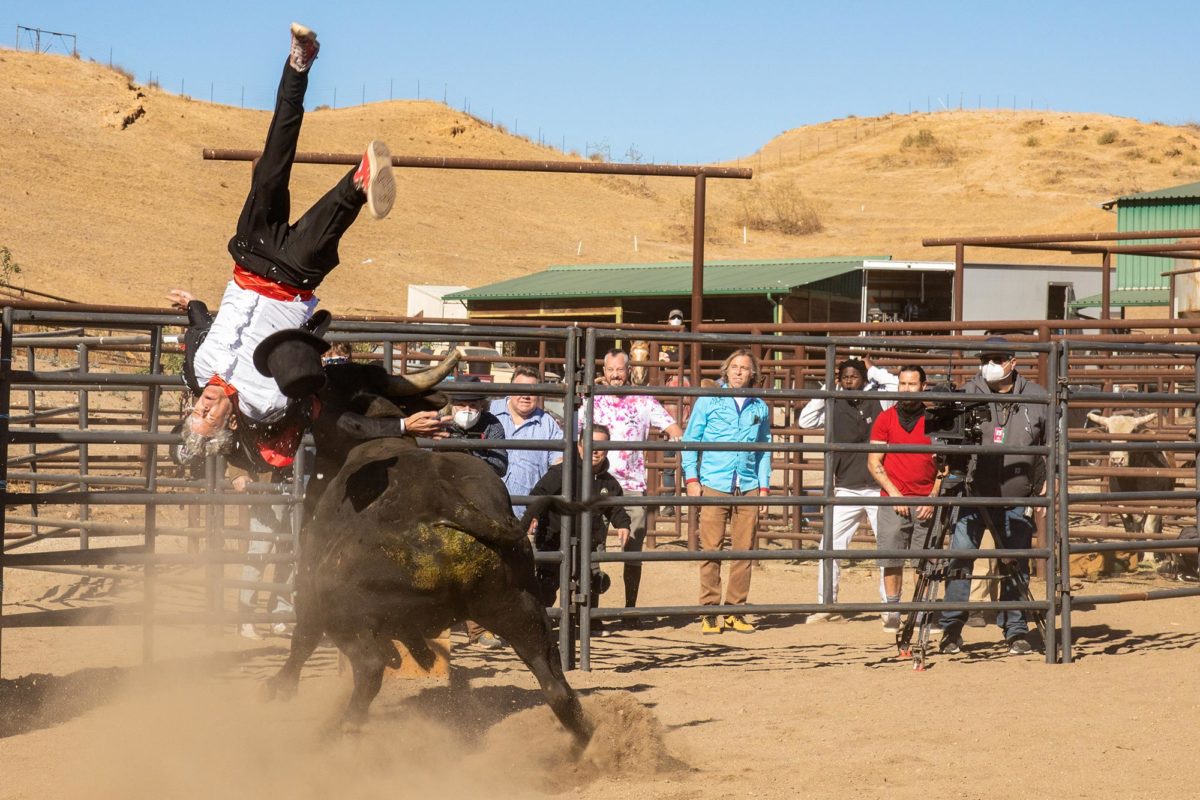
For over two decades, Johnny Knoxville and his daredevil cronies have hurt and embarrassed themselves and each other for a laugh. And there have been many, many laughs. Jackass Forever marks the fourth feature film starring the group, though we’d be remiss to forget the original, iconic television show and the hit spin-off Bad Grandpa. The marketing appears to be hitting the exact right note: what once felt wholly juvenile, ridiculous, and garish now feels nostalgic, rambunctious, even kind. There’s Knoxville’s gray hair, Steve-O’s well-earned sobriety among many other indicators of the time that has passed. Somebody cue that Green Day song. Somehow, someway, these Jackass boys have become essential to the culture. – Dan M.
The French Dispatch (Wes Anderson; Oct. 22 in theaters)
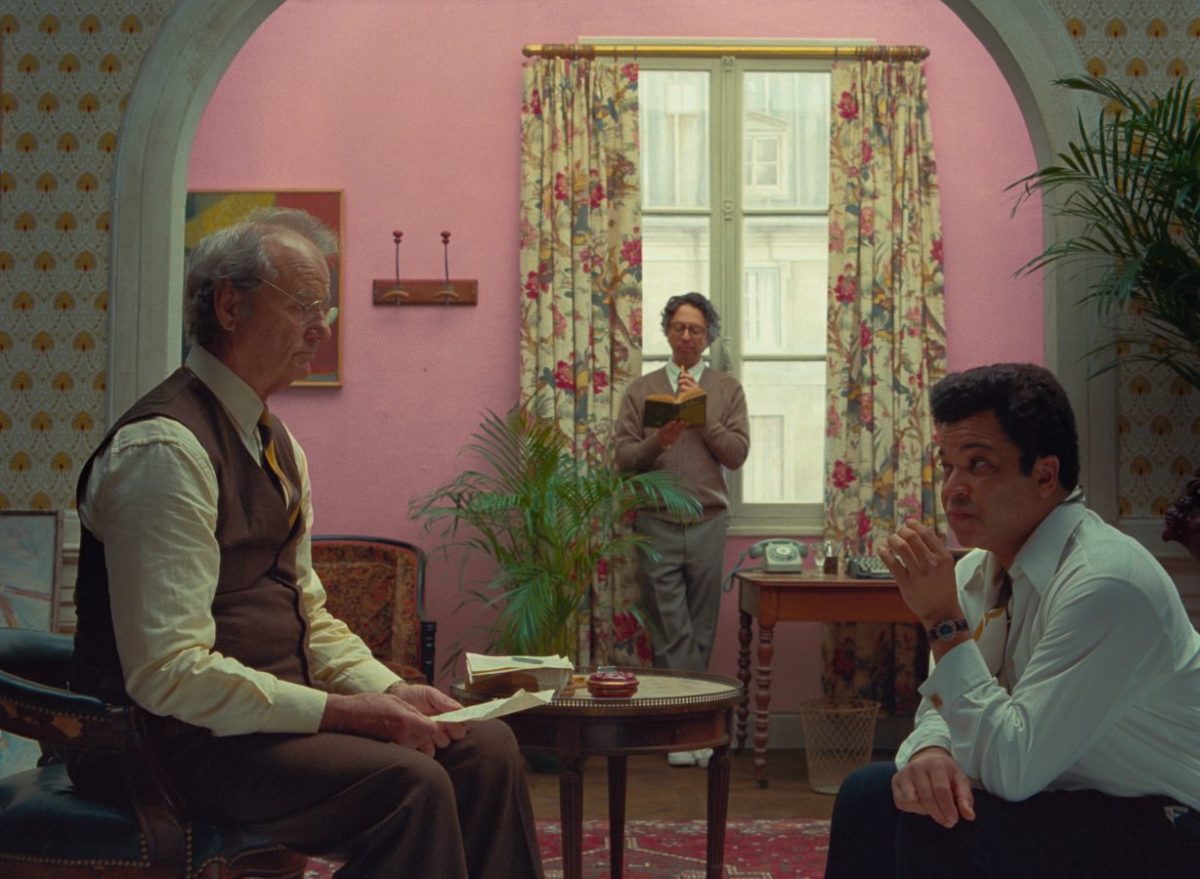
Scope around certain movie sites or Film Twitter and you may find reference to a slated upcoming DC comics adaptation title Justice League Dark—Guillermo del Toro and Doug Liman have been attached, so it’s probably not too embarrassing. The French Dispatch, in a similar naming fashion, could really be title Wes Anderson Dark, or even Wes Anderson After Dark. The film is primarily presented in black-and-white academy ratio; in the occasional color sequences its palette is still a grim, swirling miasma of moonlit tones. And the themes and subject matter couldn’t be accused of indulging anyone’s inner child, wonderful as the likes of Rushmore and Fantastic Mr. Fox remain. Isle of Dogs, flawed and sometimes misguided as it was, provided hints Anderson was growing tired of his patented, semi-cutesy aesthetic fussiness. The French Dispatch pleases as a larger fulfillment of this promise. – David K. (full review)
Passing (Rebecca Hall; Oct. 27 in theaters and Nov. 10 on Netflix)
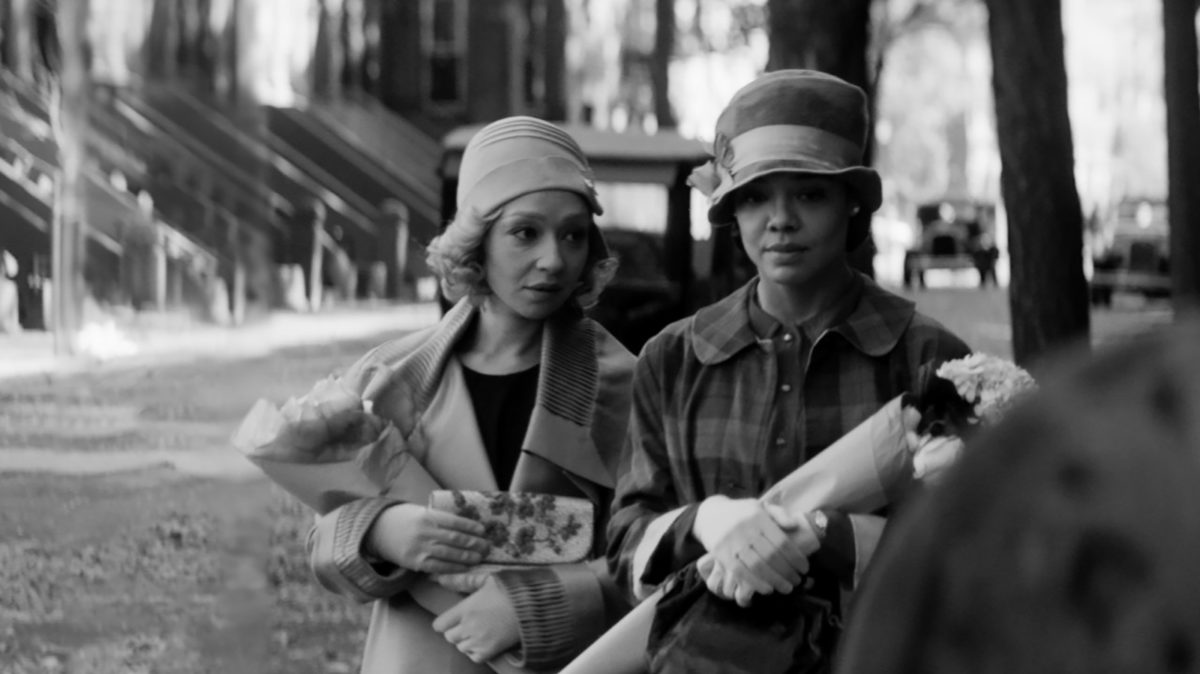
Rebecca Hall’s Passing has been fifteen years in the making, and that dedication shows in every meticulously crafted frame. Adapted from Nella Larsen’s 1929 novel, the tense, black and white psychological drama is a study in intentional filmmaking. Every detail is an obsession with symbolism and performativity, from the by-turns absent and invasive score courtesy of Devonté Hynes to the elaborate period wardrobe from Marci Rodgers, to the affect with which stars Tessa Thompson and Ruth Negga speak. This obsessiveness folds in on itself, creating a layered profile of reunited childhood friends Irene Redfield (Thompson) and Clare Bellew (Negga) whose muffled desire for one another exposes devastating cracks in each of their lives. By turns stifling and lucid with seduction, Hall’s debut is impressive, even when its atmosphere sometimes overtakes its pace. – Shayna W. (full review)
Last Night in Soho (Edgar Wright; Oct. 29 in theaters)
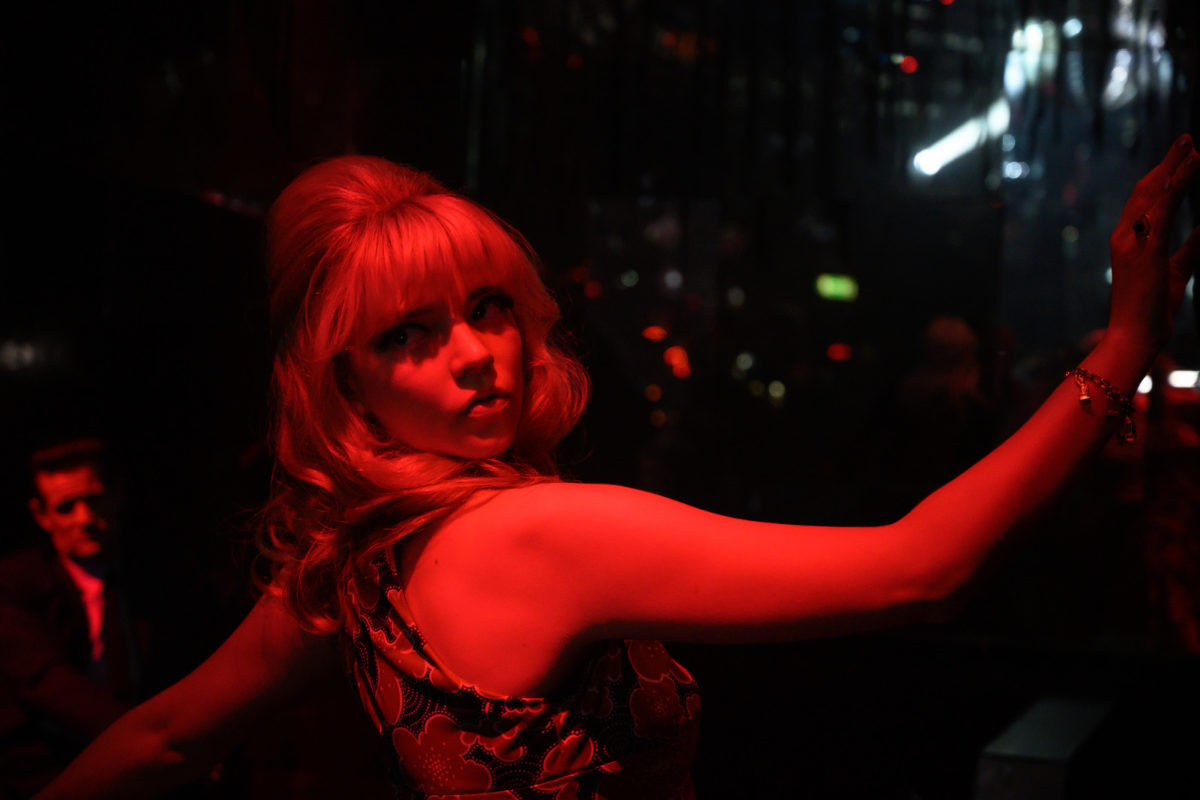
It’s a busy year for Mr. Wright. Only a couple of months ago the filmmaker unveiled his passionate documentary The Sparks Brothers. A couple of months from now he’ll unveil his next narrative feature, Last Night in Soho. It appears to offer all the flair we’ve come to expect from Wright, who is tapping into the nerve of nostalgia here. The film stars Thomasin McKenzie as Eloise, a young woman obsessed with fashion who finds herself transported back to 1960s London. Anya Taylor-Joy and Matt Smith also star, with a posthumous turn from Diana Rigg to boot. Neon colors and sharp production design abound in the marketing, hyping something that will most certainly be cool. – Dan M.
The Harder They Fall (Jeymes Samuel; Nov. 3 in theaters and on Netflix)
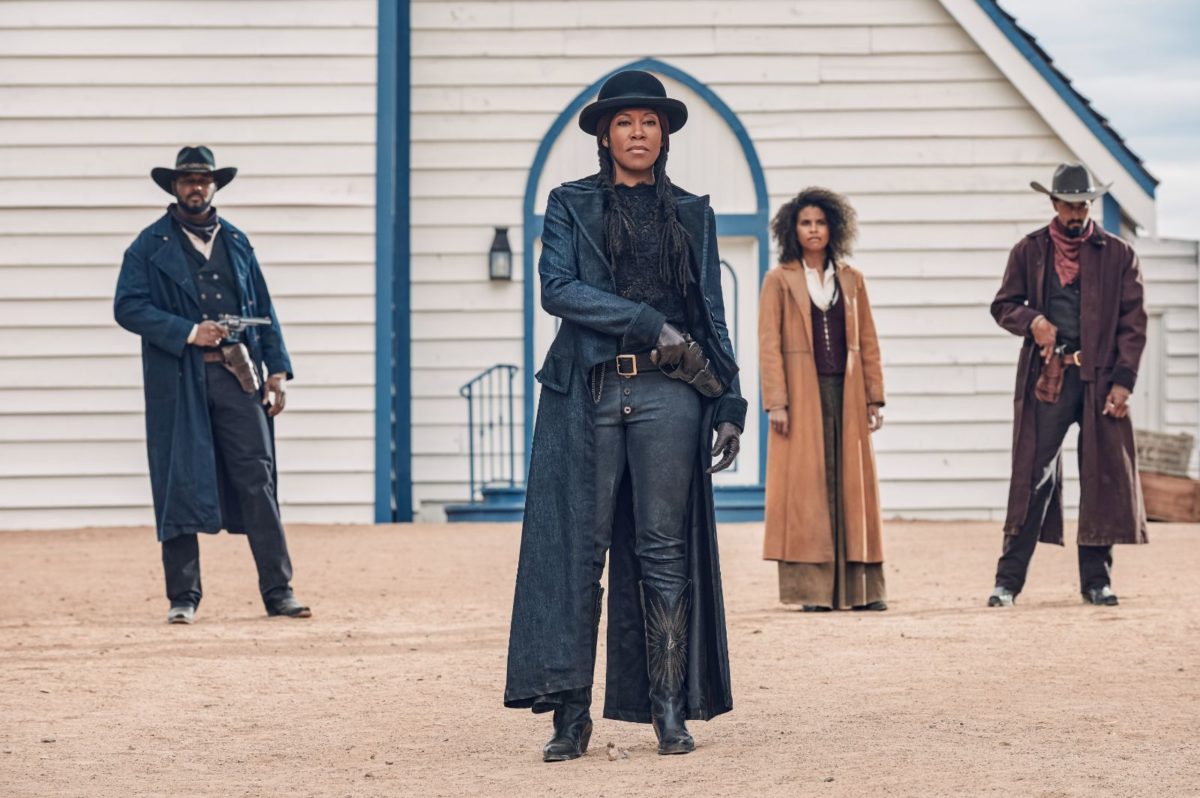
The directorial debut of musician Jeymes Samuel, The Harder They Fall is a fictionalized western about the legendary Black cowboy Nat Love who unites his former gang to take revenge on those who murdered his parents. In a genre often plagued by negative or nonexistent depictions of Black people, this Jay-Z-produced project will hopefully mark a leap forward in representing Black history in the Old West. Bolstered by an all-star cast including Idris Elba, Zazie Beetz, Lakeith Stanfield, Regina King, Jonathan Majors, and Delroy Lindo, this has the makings of a sensational experience. – Logan K.
Spencer (Pablo Larrain; Nov. 5 in theaters)
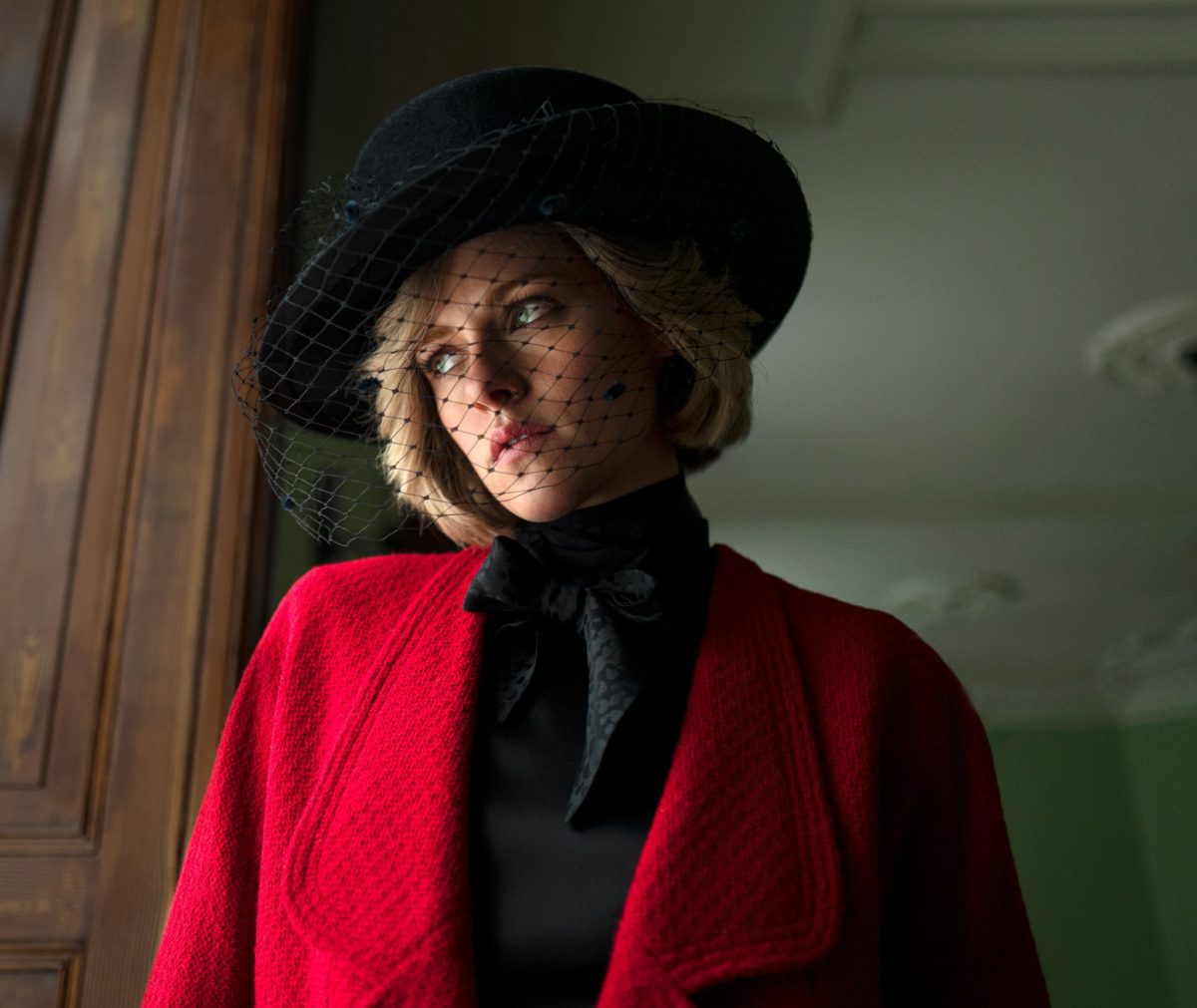
If Pablo Larrain’s new film, starring Kristen Stewart as Diana Spencer, is half as beautiful as its poster, Spencer will be something to remember. The film follows young Diana, Princess of Wales, in 1991 as she considers ending her marriage to Prince Charles. The obvious comparison is Larrain’s own Jackie from five years back, which earned Natalie Portman an Oscar nomination for her portrayal of Jackie Kennedy Onassis in the aftermath of JFK’s assassination. Stewart, like Portman, parlayed early success in a huge franchise into an eclectic career full of diverse work. It’s hard not to think that Spencer could be an inflection point for the accomplished actress, wherein critics and audiences alike come out to celebrate her talent. – Dan M.
The Beta Test (Jim Cummings & PJ McCabe; Nov. 5 in theaters)
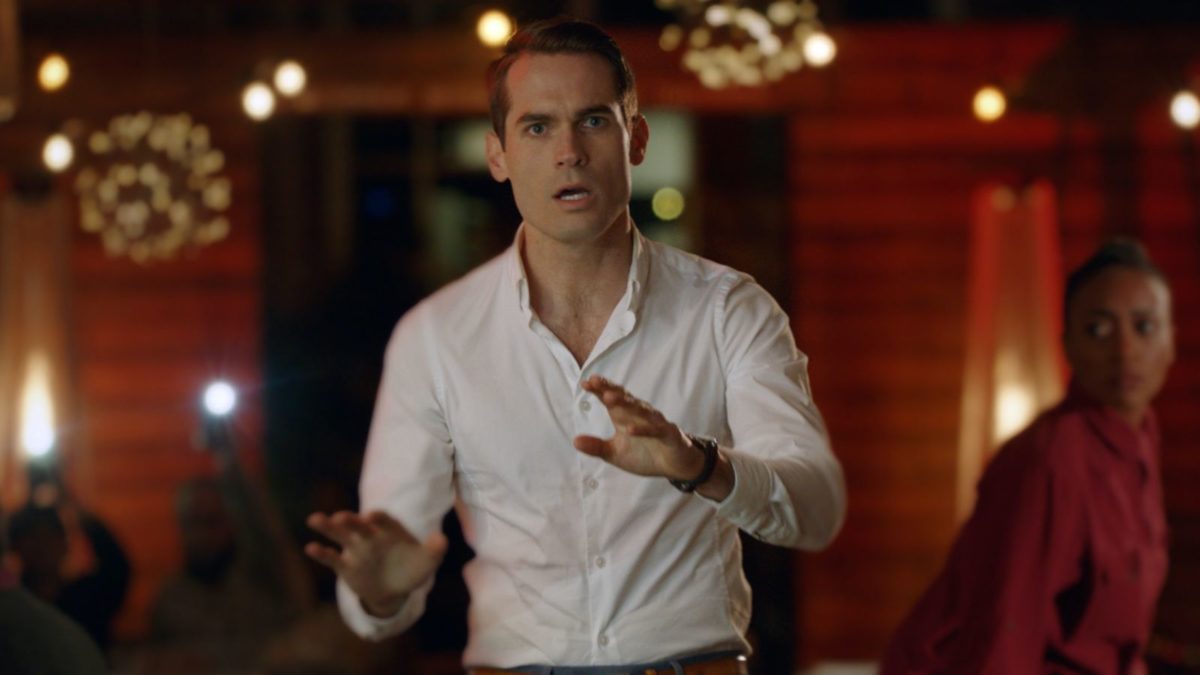
Jim Cummings has become something of an indie film wunderkind, making low-budget, critically-acclaimed projects that hit festivals and reach the depths of Film Twitter, many members of which Cummings used to follow from his own account. Partnering with PJ McCabe to co-direct, co-write, and co-star in The Beta Test, Cummings’ latest feature concerns modern relationships. With Cummings taking the lead as Hollywood agent and resident douchebag Jordan, his story and performance rarely cease to be over-the-top—billed as a horror-thriller, The Beta Test turns towards violence as its narrative becomes muddled with convoluted data breaches and sex-induced madness. – Michael F. (full review)
Hive (Blerta Basholli; Nov. 5 in theaters)
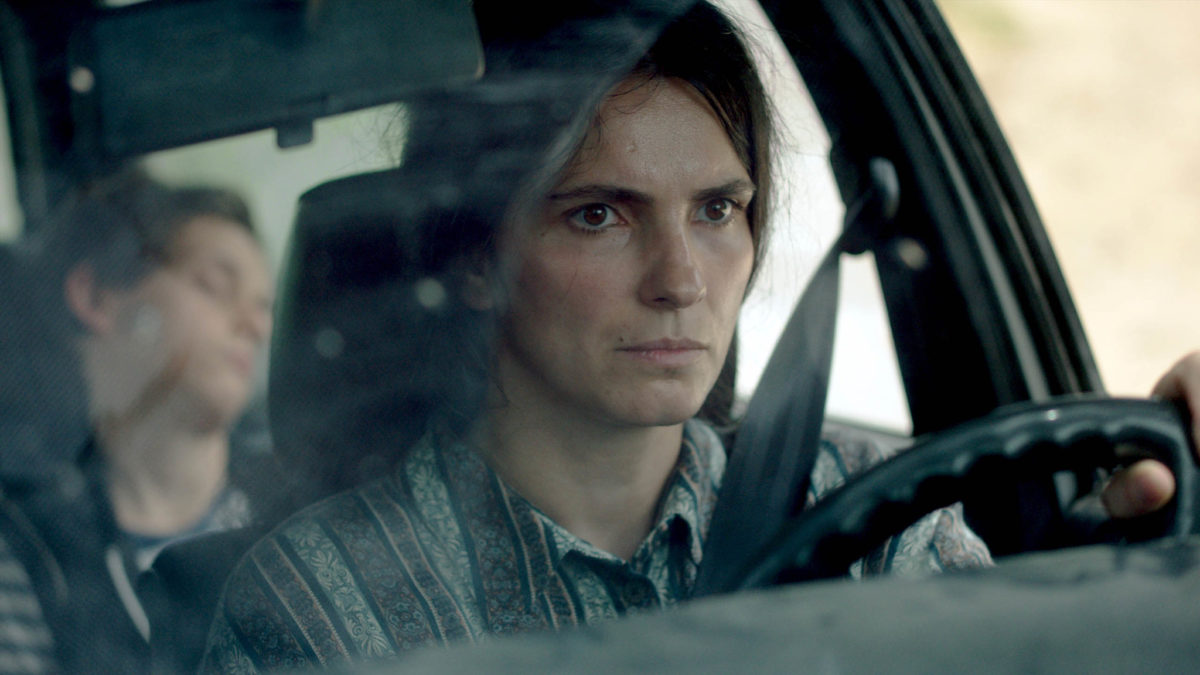
Hive has a similar based-on-a-true-story inspirational narrative as many English-language crowdpleasers: through sheer force of will, a resilient woman triumphs against great personal and systemic obstacles. These sorts of films are cranked out by studios, particularly in the UK, all the time (just last year we had Misbehaviour), usually in glossy packaging and with a comedic bent. Hive, however, trades that gloss for a handheld camera and a washed-out colour palette. It removes the laughs, because this is post-war Kosovo, and life is tough and grey for beekeeper Fahrije (Yllka Gashi). – Orla S. (full review)
The Power of the Dog (Jane Campion; Nov. 17 in theaters and on Dec. 1 on Netflix)
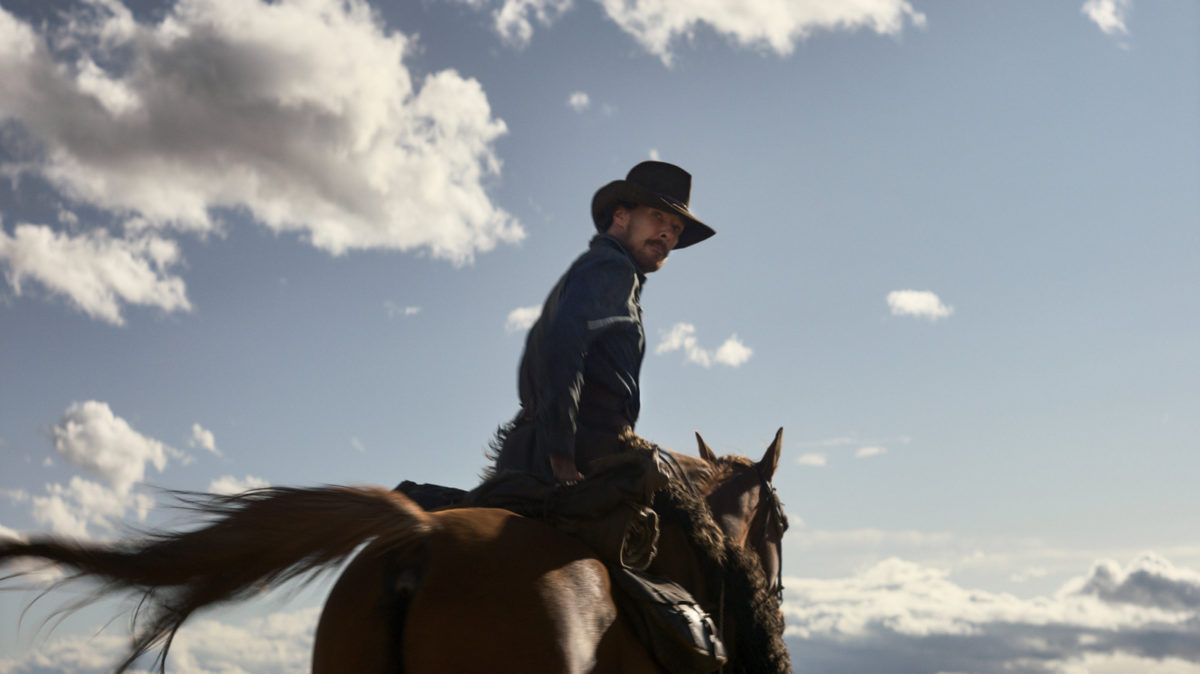
A new Jane Campion picture is a victory all its own. The stacked cast––Benedict Cumberbatch, Kirsten Dunst, Jesse Plemons, Kodi Smit-McPhee, Thomasin McKenzie, Frances Conroy, Keith Carradine, Peter Carroll, Adam Beach––and Jonny Greenwood score are icing on the cake. The Power of the Dog concerns the Burbank brothers (Cumberbatch & Plemons), wealthy ranchers in Montana whose lives grow more complicated when one brother brings home a wife (Dunst) and son (Smit-McPhee). The trailer teases beauty, cruelty, and a whole lot of whistling. – Dan M.
Bad Luck Banging or Loony Porn (Radu Jude; Nov. 19 in theaters)
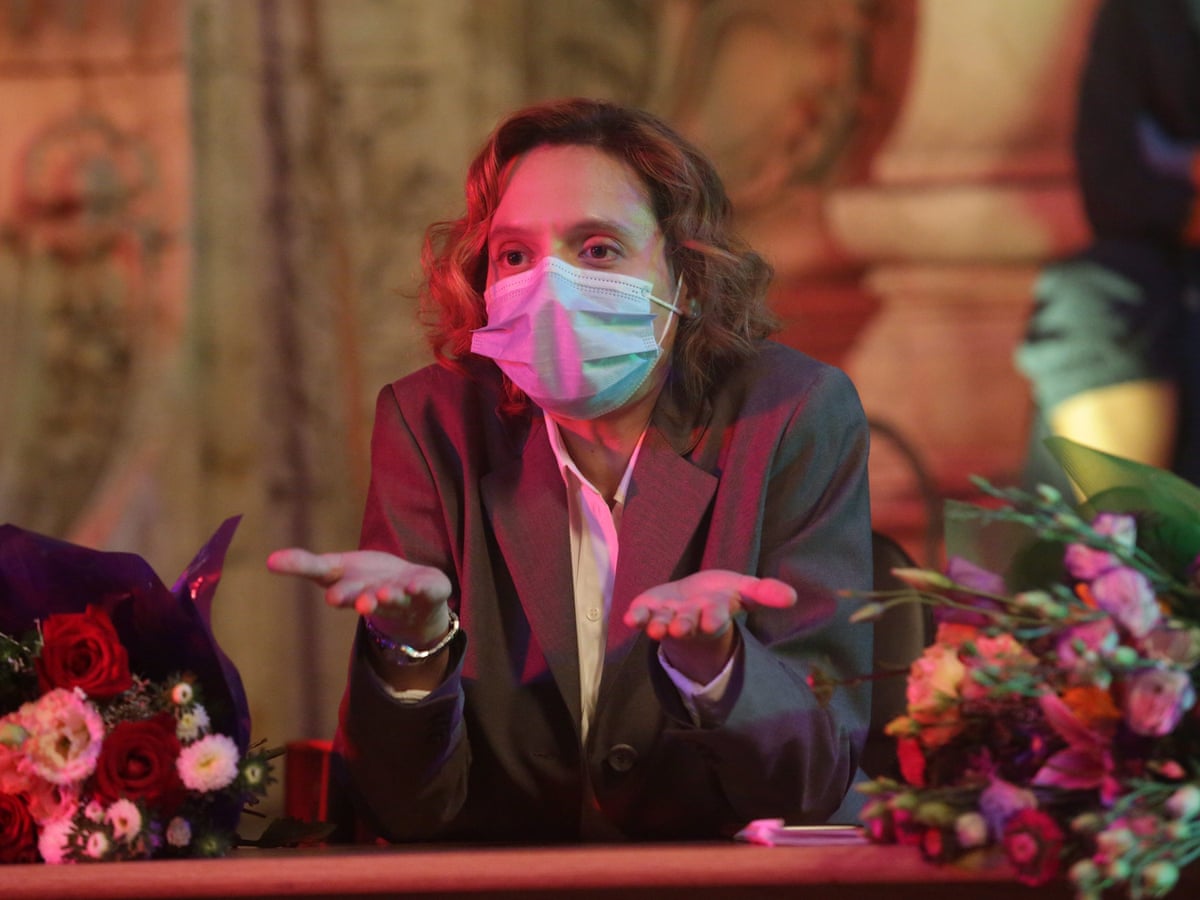
As his old compatriots dabble in as far flung places as comic noirs (The Whistlers) and über-dense period symposiums (Malmkrog), it’s interesting that Radu Jude has lately emerged as the most contemporary minded of Romania’s great generation of filmmakers. Even when dabbling in the past (Aferim!, Uppercase Print) his films are intrinsically linked to the here and now. In attempting to address the current moment, his latest, titled Bad Luck Banging or Loony Porn, is amongst the first of what can only be a limited amount of significant films to be made both in and of the pandemic. – Rory O. (full review)
Top Gun: Maverick (Joseph Kosinski; Nov. 19 in theaters)
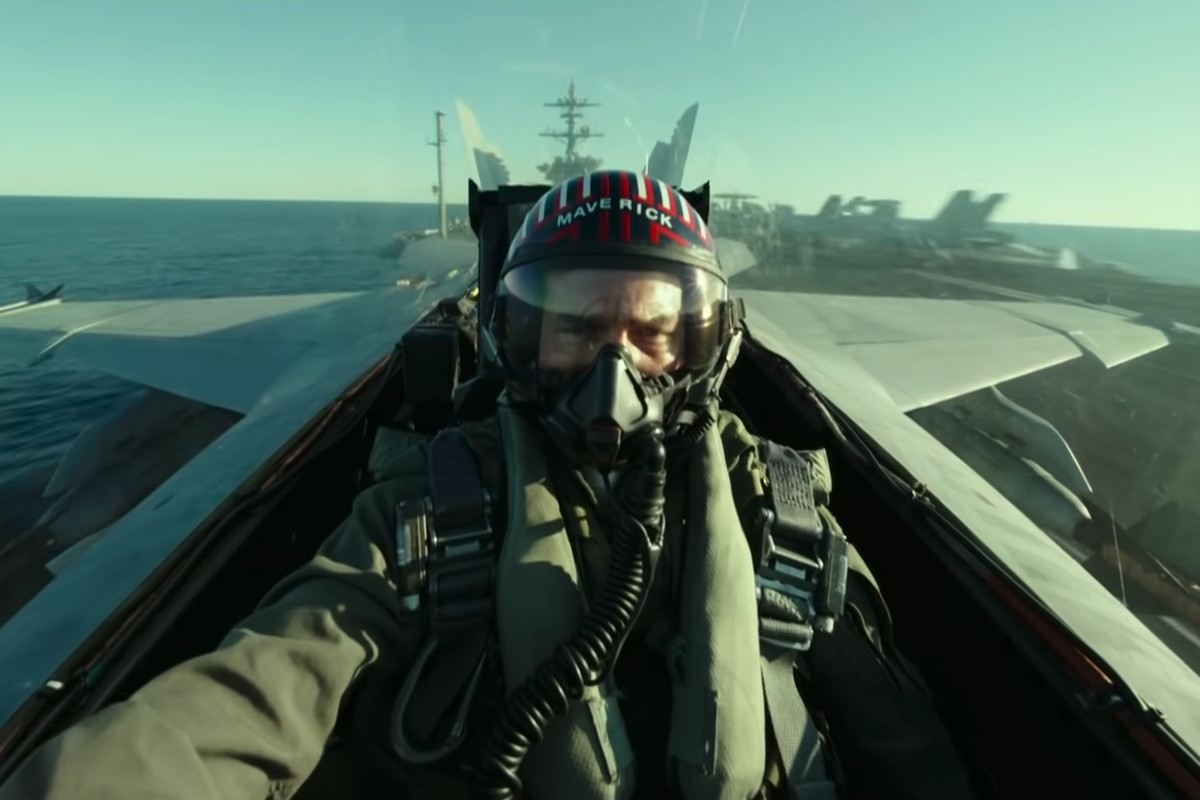
This highly anticipated sequel to the 1986 original is one of the bigger blockbusters most directly affected by the ongoing COVID-19 pandemic. Multiple release dates have been canceled, multiple trailers have intrigued, only to fade into the distance. Here’s hoping the November 2021 opening holds true. Tom Cruise returns as Pete “Maverick” Mitchell, ordered to teach a new batch of naval aviator recruits, including the son (Miles Teller) of his long-deceased best friend Goose. Jennifer Connelly and Jon Hamm also co-star, along with an appearance by Val Kilmer, who reprises his role as Iceman. There promises to be stunts and action sequences that will seem as psychotic as they are thrilling. – Dan M.
House of Gucci (Ridley Scott; Nov. 24 in theaters)
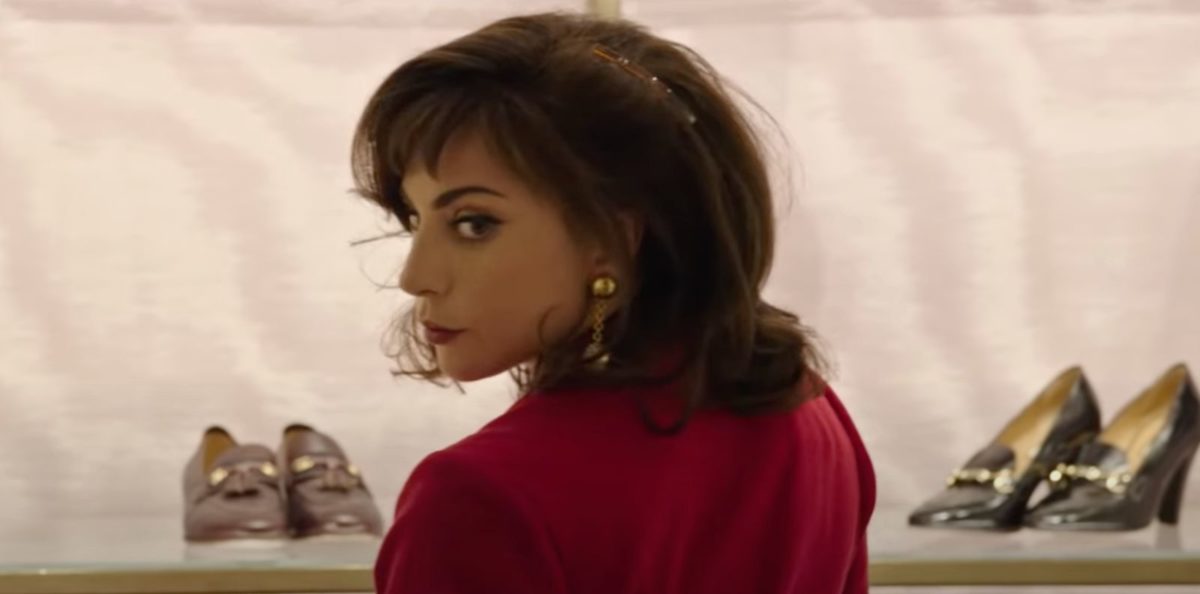
Earlier this year, cinematographer Dariusz Wolski told us this film would be “a bit of a kitschy, funny, tragic tragedy––like a high-end soap opera.” Then the first trailer seemed to confirm this sentiment. House of Gucci stars Lady Gaga as Patrizia Reggiani, who was convicted of ordering the murder of her ex-husband and fashion scion Maurizio Gucci (played by Adam Driver). The stacked cast also includes Jared Leto, Jeremy Irons, Jack Huston, Salma Hayek, Al Pacino, make-up, and prosthetics. Lots and lots of prosthetics. In short, House of Gucci looks like an absolute blast. This writer will be there opening day. – Dan M.
Untitled PTA aka Soggy Bottom (Nov. 26 in theaters)
Considering how little we’ve seen from it, it’s hard to believe Paul Thomas Anderson is putting the finishing touches on his next feature. Will it be a high school ensemble film? A movie about Hollywood? Or about local politics? We wager it may be a mix of all three (and more), and the excitement of not knowing precisely what to expect will hopefully be intact until opening day. What we do know, however, is it stars Philip Seymour Hoffman’s son, Cooper Hoffman, as well as Bradley Cooper, Alana Haim, Benny Safdie, Nate Mann, Skyler Gisondo, Mary Elizabeth Ellis, Destry Allyn Spielberg, and Sean Penn. – Jordan R.
Zeros and Ones (Abel Ferrara; Nov. TBD in theaters and on VOD)
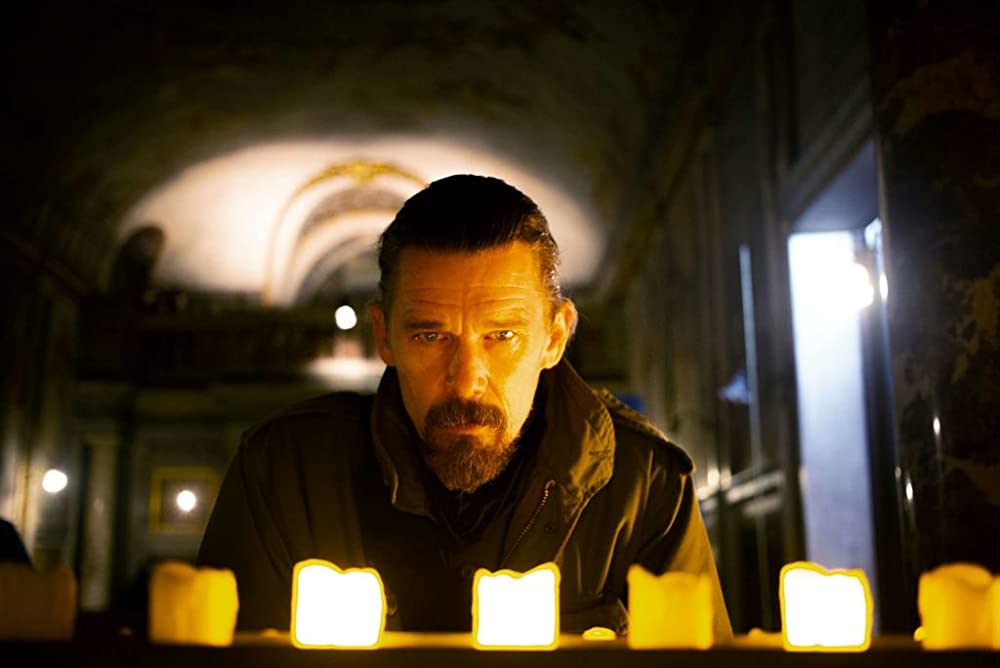
The city of Rome certainly means something to Abel Ferrara. A new home after being priced-out and disgusted by the “new” New York, it’s served in recent films as both a liberating and confining environment for tortured artists. Yet in his latest film, Zeros and Ones, we’re plunged into a land outside whatever Ferrara’s probably even imagined. Beyond just the grainy, handheld photography provided by Alex Ross Perry and Safdie Brothers veteran Sean Price Williams, drones map out the vacant night, providing glimpses of its extreme 2020 lockdown—a city symphony of the world’s deadest metropolis. – Ethan V. (full review)
The Humans (Stephen Karam; Nov. TBD in theaters)
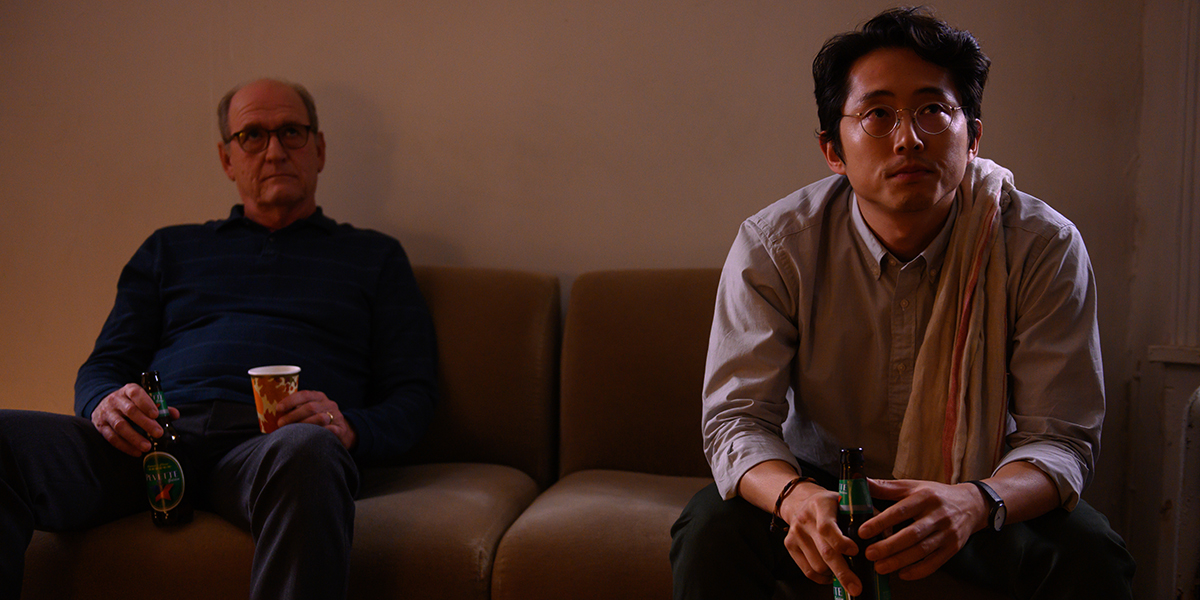
This film adaptation of the Tony Award-winning one-act play has the interesting distinction of being the directorial debut of the playwright himself: Stephen Karam. Rarely does the writer of the original text retain full control of the Hollywood adaptation (Stephen Chbosky and The Perks of Being a Wallflower come to mind as a rare example). The Humans stars Beanie Feldstein, Jayne Houdyshell, Richard Jenkins, Amy Schumer, Steven Yeun, and June Squibb. The film follows the Blake family, who converge on their daughter’s New York City apartment for Thanksgiving. Tensions grow and emotions rise as everyone in the small space must face some harsh realities. – Dan M.
Benedetta (Paul Verhoeven; Dec. 3 in theaters and on VOD)
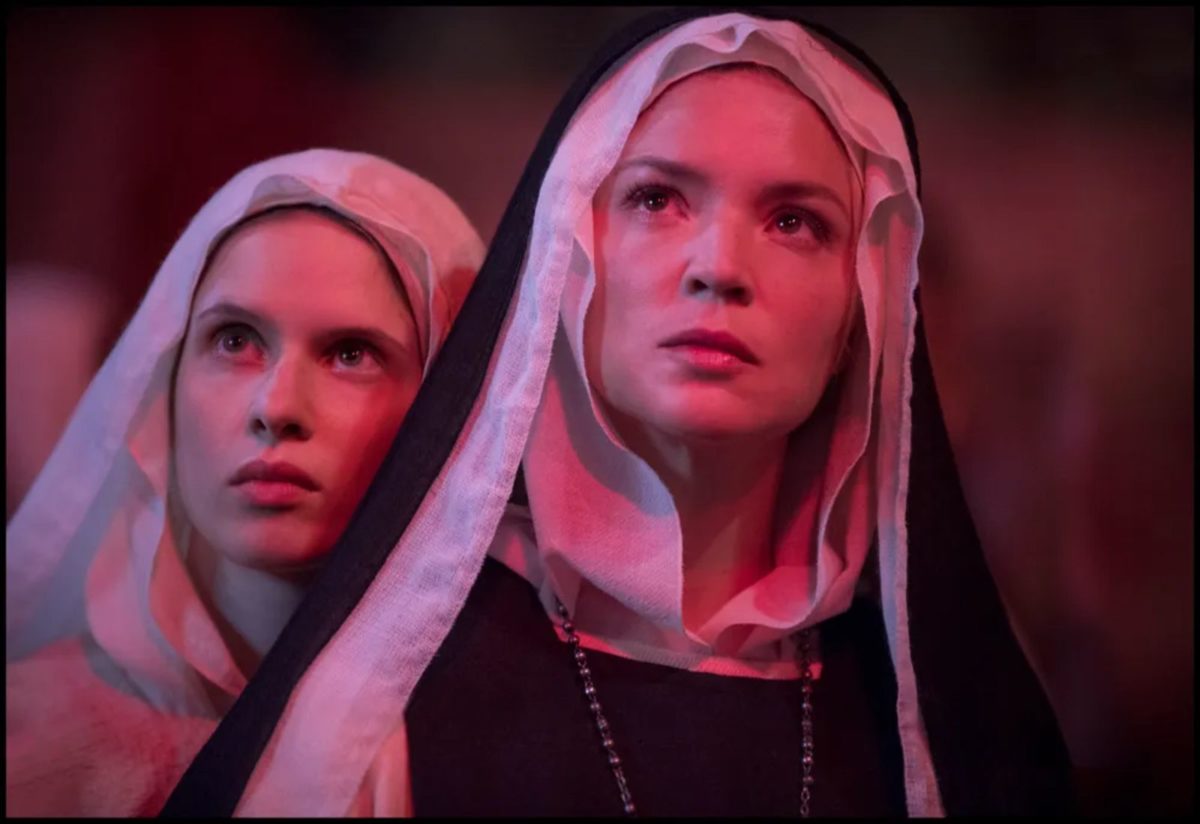
Many of the best qualities of early and late Verhoeven combine in Benedetta, a tale of sex, blood, and sacrilege in 17th-century Italy. Based on the American historian Judith C. Brown’s 1986 non-fiction book Immoral Acts: The Life of a Lesbian Nun in Renaissance Italy (quite the title), its story focuses on the life of Benedetta Carlini, a nun in Precia who entered a sexual relationship with another woman in her convent. Paul Verhoeven originally adapted the book with his longtime collaborator Gerard Soeteman (Black Book, Turkish Delight), but the screenwriter stepped down when it became too “sexualized.” In the opening act there are not one, but two fart jokes. We are also, in many instances, offered evidence of the director’s well-founded appreciation for mommy’s milkies. – Rory O. (full review)
Nightmare Alley (Guillermo del Toro; Dec. 3 in theaters)
It’s hard not to be excited for this remake when you consider the filmmaker and cast. Guillermo del Toro directs––deep breath––Bradley Cooper, Cate Blanchett, Rooney Mara, Willem Dafoe, David Strathairn, Mary Steenburgen, Richard Jenkins, and many others in this deeply demented story concerning a con-man carny and his squalid reach for success. The 1947 original was a passion project for its matinee idol star Tyrone Power, then a crushing disappointment at the box office. Over time the film has rightfully earned its distinction as a seminal noir picture, and this high-profile adaptation might only add to its legend. – Dan M.
Flee (Jonas Poher Rasmussen; Dec. 3 in theaters)
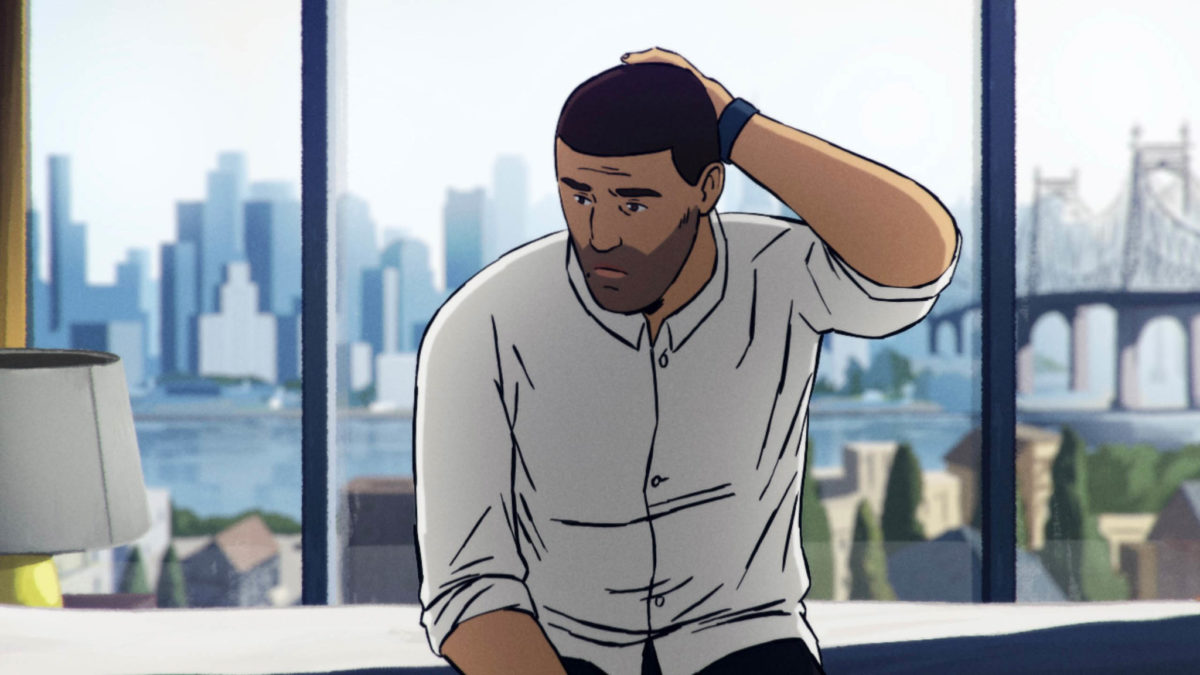
There have, of course, been a great many animated films about deeply serious subjects, many in recent years—Persepolis to Anomalisa to Waltz With Bashir. Jonas Poher Rasmussen’s Flee can now comfortably fit on this shelf of profoundly affecting films. Indeed, this 2021 Sundance Film Festival premiere ranks as one of the most uniquely memorable animated films of the last decade. It is remarkably successful as a study of the refugee experience, as a coming-of-age drama set against a backdrop of fear and danger, and as a tribute to one individual’s ability to survive and even flourish. – Chris S. (full review)
France (Bruno Dumont; Dec. 10 in theaters)
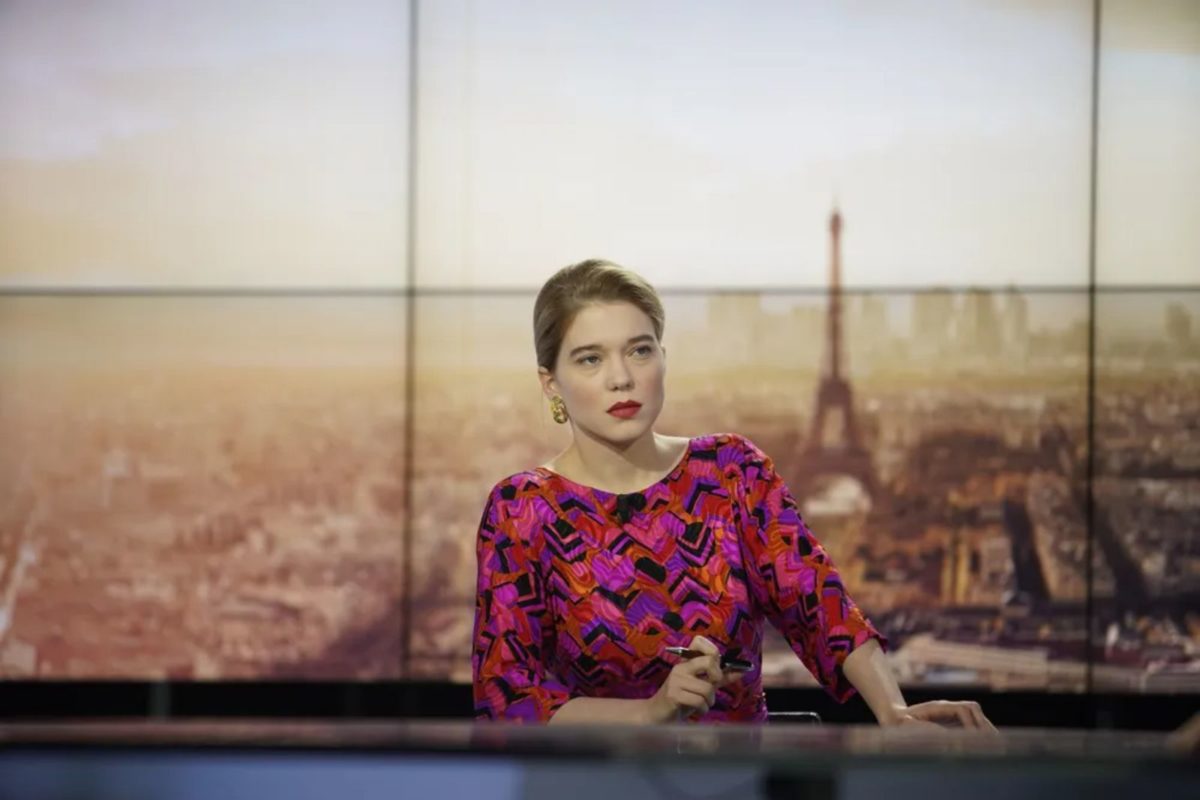
“My work is all about transfiguration… I’m not a naturalistic filmmaker at all.” So goes one of the most widely quoted statements by French auteur Bruno Dumont, now as noted for his bold stylistic experimentation across different genres as he is the dour, powerful slabs of “transcendental” cinema with which he first made his name at the turn of the millennium. Here lies a blindspot of director-focused appreciation: his latest film France has the appearance of a glossy, luxe piece of entertainment––almost a French Succession––that could appeal to a wide, even non-cinephilic audience across its home country. But those familiar with his output can’t help scan the precis of this film and perceive a likely Trojan Horse, or a piece of subversion at cross-purposes with its exterior sense. Is this the regressive underside of auteurism, that secretly wants our favorites to make a recognizably similar film each time out the block? – David K. (full review)
West Side Story (Steven Spielberg; Dec. 10 in theaters)
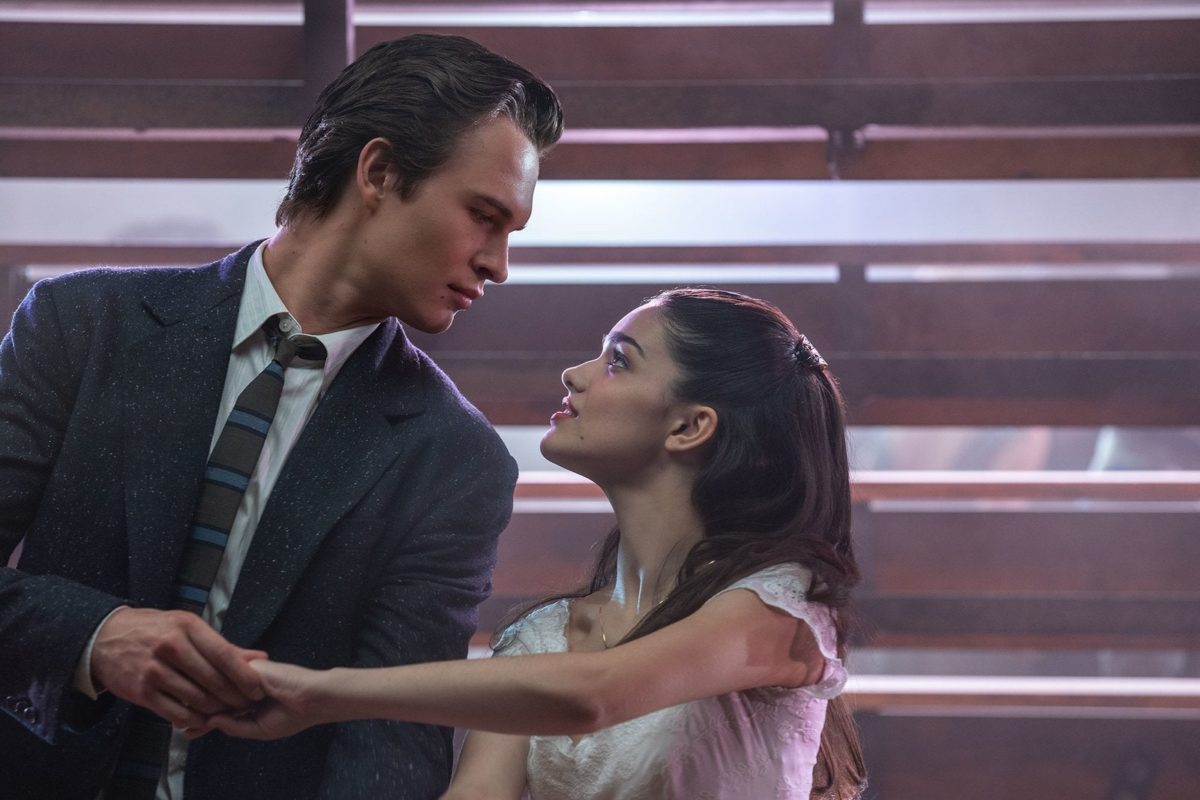
If you’re reading this, you most likely know West Side Story. You’ve most likely seen the 1961 classic, directed by Jerome Robbins and Robert Wise, starring Natalie Wood and Richard Beymer. It won TEN Oscars! One of them was an iconic win for the great Rita Moreno, who is now set to appear in director Steven Spielberg’s upcoming remake, from a script by Tony Kushner based, of course, on the book by Arthur Laurents. Rachel Zegler will star as Maria, while Ansel Elgort is playing Tony. Trailers suggest a departure from Spielberg cinematographer Janusz Kaminski’s usual blown-out aesthetic. Perhaps something in-between homage to the original’s iconic look and a more subdued, modern tone. It may not feel necessary, but a new West Side Story could emerge as the perfect Christmas present for many. – Dan M.
The Lost Daughter (Maggie Gyllenhaal; Dec. 17 in theaters and Dec. 31 on Netflix)

After playing a wannabe director for three seasons on HBO’s The Deuce, Maggie Gyllenhaal will be doing the real thing with her feature directorial debut. An adaptation of the Elena Ferrante (My Brilliant Friend) novel of the same name, The Lost Daughter stars Olivia Colman as a woman who must come to terms with her past as she begins a friendship with a young woman and her daughter. Colman is in great company—she stars alongside Jessie Buckley, Dakota Johnson, Paul Mescal, Peter Sarsgaard, and Ed Harris. To further increase our anticipation, Hélène Louvart (Never Rarely Sometimes Always, Happy as Lazzaro) serves as cinematographer. – Stephen H.
The Matrix Resurrections (Lana Wachowski; Dec. 22 in theaters and on HBO Max)
Contemporary sci-fi’s greatest saga only grew richer in the 18 years since its, er, ostensible conclusion—what was once considered a classic and two embarrassing misfires has been embraced by new generations and those who think they got it wrong alike, revealed not as an also-ran but dense tapestry of idea and form. Certainly superior to almost anything of its ilk pushed forward by Hollywood in the nearly two decades since. There’s thus a unique hope surrounding The Matrix Resurrections, Lana Wachowski’s return to the story she and (absent) sister Lily used to explore the strange consciousness of a new century that’s only grown darker and more despairing since. (And their own identities, but maybe it’s not my place to discuss that.) Of everything big and loud peddled this remaining year, nothing bears such hope. — Nick N.
Parallel Mothers (Pedro Almodóvar; Dec. 24 in theaters)
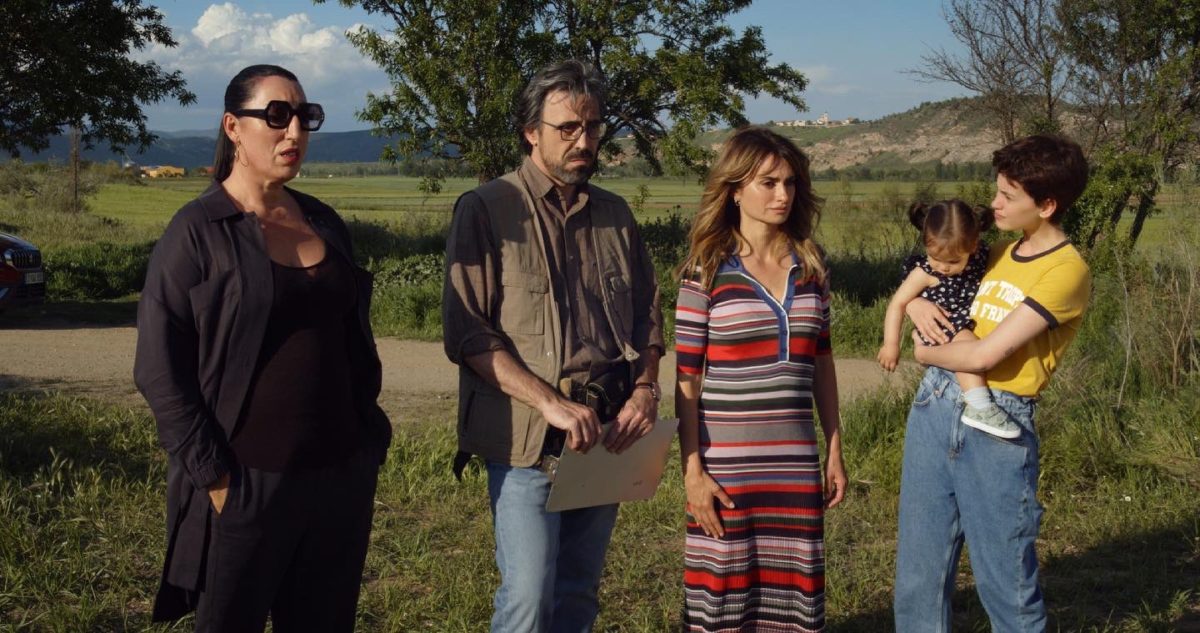
Pedro Almodóvar and star Penélope Cruz have yet to make a bad movie together, one of many reasons to look forward to Parallel Mothers. Set in Madrid, it tells the story of two women who give birth on the same day. Cruz herself has said it will explore “the feminine world of new mothers, of mothers who are raising children in the first and second year.” Not surprisingly, Parallel Mothers appears to be provocative, highly dramatic, and rich in detail. Almodóvar has gotten to a stage in his career where he seems taken for granted. It’s important we take a moment and appreciate what he’s given us, and that there is still more to offer. – Dan M.
The Tragedy of Macbeth (Joel Coen; TBD in theaters and on Apple TV+)
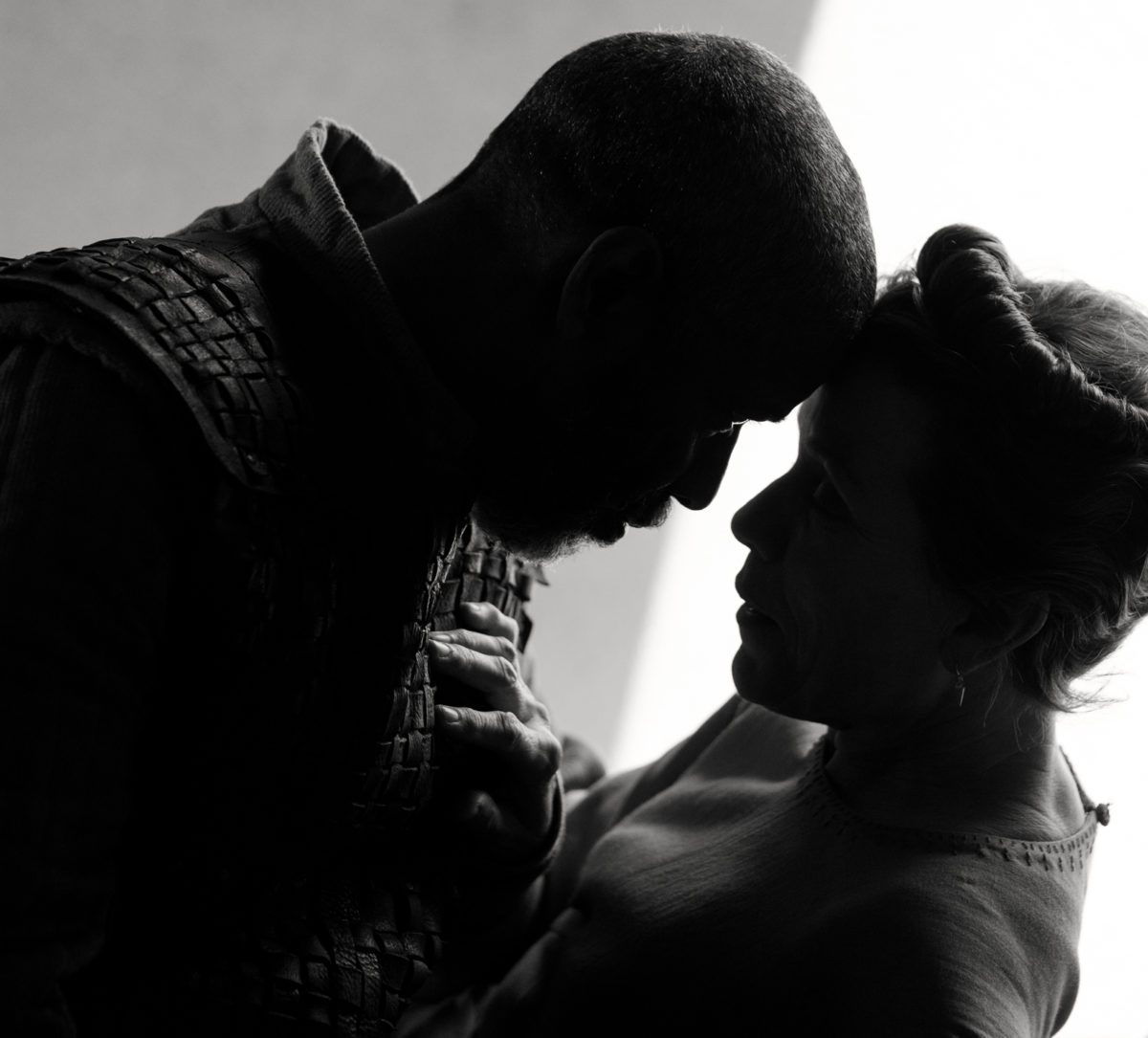
And then there was one. Coen brother, that is. With The Tragedy of Macbeth set to open the 59th New York Film Festival, the world will be witness to the first Joel Coen picture sans Ethan. In what is apparently a faithful adaptation of Shakespeare’s iconic tragedy, Denzel Washington stars as the titular Macbeth with Frances McDormand playing his Lady. Shot in black-and-white and also starring Brendan Gleeson, Corey Hawkins, Moses Ingram, Harry Melling, and Ralph Ineson, The Tragedy of Macbeth feels like a departure for Coen, and yet oddly appropriate. So much of the Coen brothers’ filmography has captured the irony and consequence of ambition. What is Macbeth if not the ur-text for such a thing. Here’s hoping Joel maintains that patented sense of humor. – Dan M.
The Souvenir Part II (Joanna Hogg; TBD in theaters)
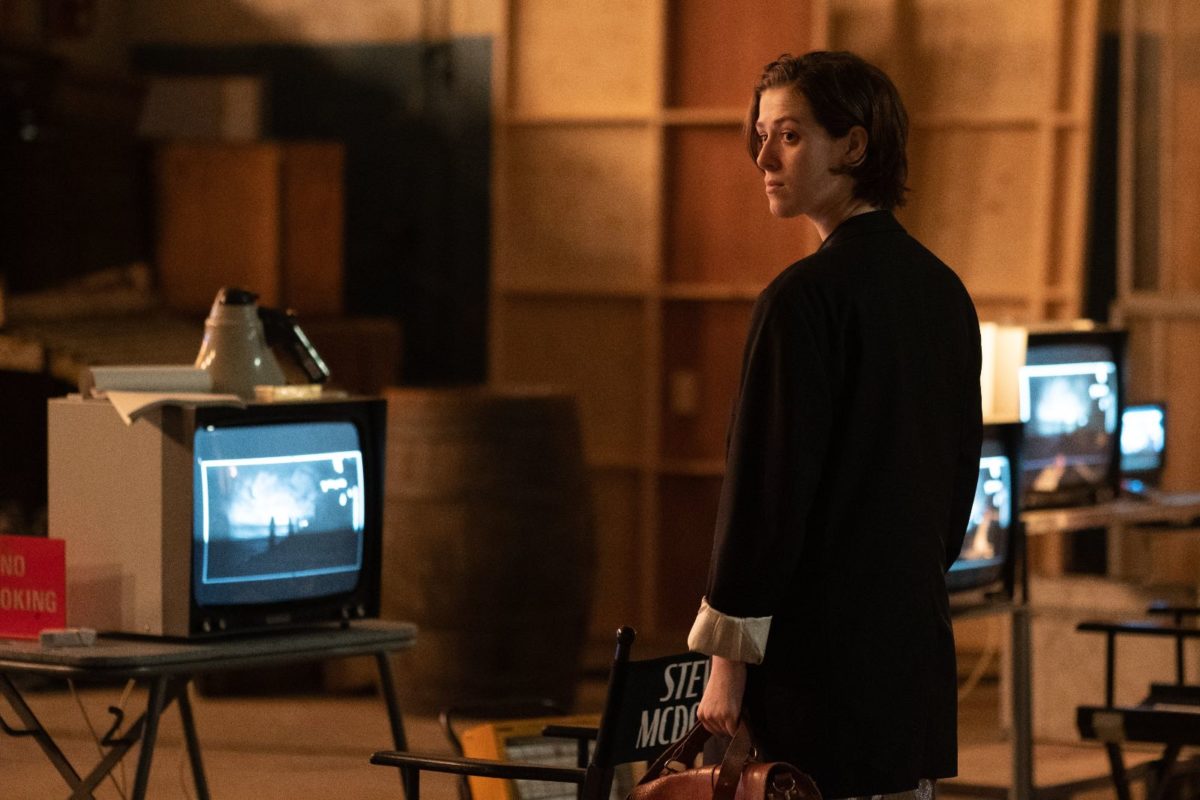
At the end of The Souvenir, Joanna Hogg filmed a film in the process of being made. She returns with The Souvenir Part II, a film all about filmmaking and its layered realities and projections. One of the best British directors to emerge this century, Hogg first made her name as a brilliant examiner of the British middle-classes, a fine-comber of their vagaries and mores. One of the most interesting things about her earlier films—Unrelated (2007), Archipelago (2010), and Exhibition (2013)—was the rigor with which she kept her distance: shooting from afar, fragments of conversations, few close-ups. For The Souvenir, a candid work of autofiction, she went the opposite direction and had her biggest success while also making her most conventional work. – Rory O. (full review)
A Hero (Asghar Farhadi; TBD in theaters and on Amazon Prime)
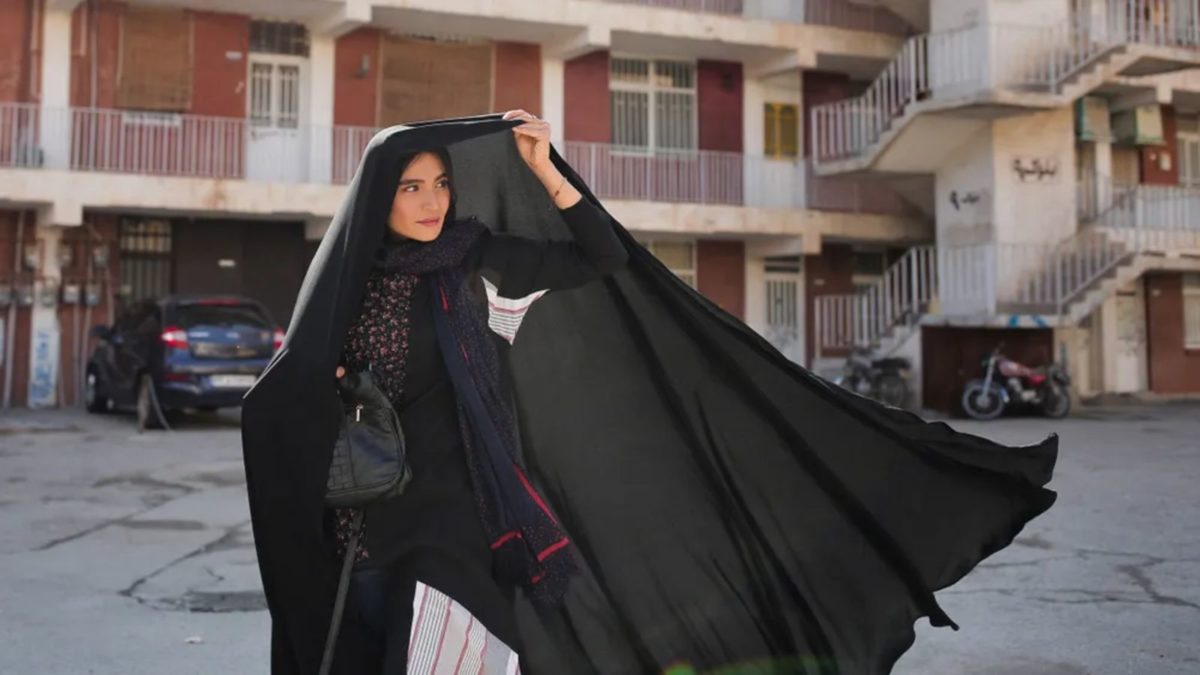
In A Hero, the discovery of a bag of gold coins sets the scene for a knotted Bressonian morality tale. The director is Asghar Farhadi, a filmmaker who has spent his career examining those blurred lines between right and wrong; decency and hubris; righteousness and folly. Taking place in the city of Shiraz, it proves a return to familiar ground for him: both the first he has made in his native Iran after the awful misstep that was Everybody Knows, as well as a return to the moral complexities of A Separation, still his finest film to date. – Rory O. (full review)
C’mon C’mon (Mike Mills; TBD in theaters)
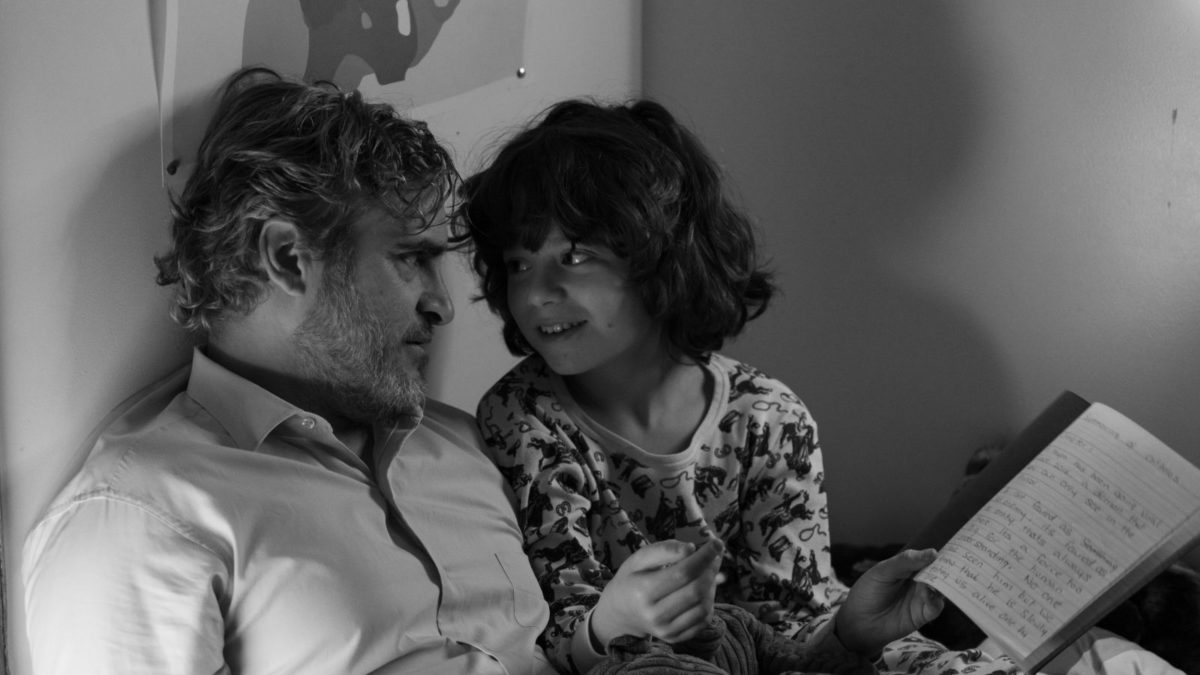
Few directors work a bigger gap between palatability of premise and effectiveness of final results, and we think the results of Beginners and 20th Century Women validate C’mon C’mon‘s placement. Though Mike Mills’ latest is a first for not sounding so unbearable on paper: wherein Joaquin Phoenix takes his nephew across the country while “coming to terms with personal trauma and historical legacies.” (Probably a better use of this actor’s talents than his last movie, anyway.) Mills, whose extensive background is mostly in music videos and commercials, has always had an intelligent eye for color; add to our intrigue how C’mon C’mon, shot by veteran Robbie Ryan, will make use of a stark-seeming black-and-white. – Nick N.
Red Rocket (Sean Baker; TBD in theaters)
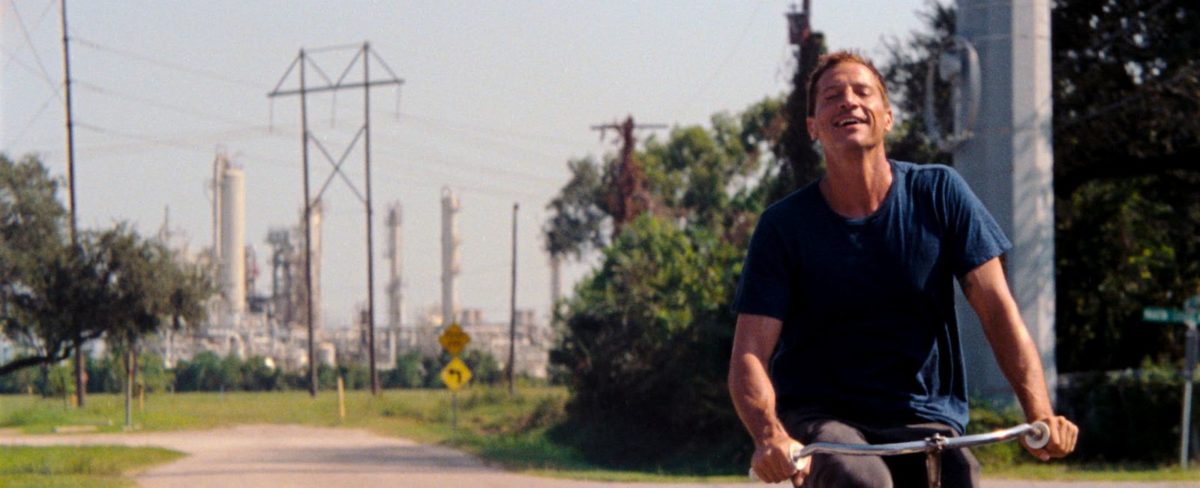
Texas City in Galveston County, Texas, in the summer of 2016. Mikey Saber (Simon Rex)—or Mike Davies, as he’d rather not be called—lopes off a greyhound bus into the broiling heat, covered in facial bruises, his possessions only a stale, dirt-caked sports bag thrown over his shoulder. This is no triumphant Odyssean homecoming, a prodigal son welcomed into the bosom of redemption. He is trouble: all devilishly good-looking male-model cheekbones and taut physique, whose real desire to please induces nothing but suffering to others and himself. This is his latest rodeo. – David K. (full review)
Honorable Mentions
- Worth (Sept. 3)
- Mogul Mowgli (Sept. 3)
- Dating & New York (Sept. 10)
- Language Lessons (Sept. 10)
- Fire Music (Sept. 10)
- Little Girl (Sept. 17)
- Freeland (Sept. 17)
- Saint-Narcisse (Sept. 17)
- Blue Bayou (Sept. 17)
- Surge (Sept. 24)
- Falling for Figaro (Oct. 1)
- Coming Home in the Dark (Oct. 1)
- Jacinta (Oct. 8)
- Ascension (Oct. 8)
- Lamb (Oct. 8)
- Needle in a Timestack (Oct. 15)
- Antlers (Oct. 29)
- A Cop Movie (Nov. 5)
- Kurt Vonnegut: Unstuck in Time (Nov. 19)
- King Richard (Nov. 19)
- Clerk (Nov. 23)
- The Hand of God (Dec. 3)
- Don’t Look Up (Dec. 10)
- Jockey (Dec. 29)
- The Novice (Dec. TBD)
